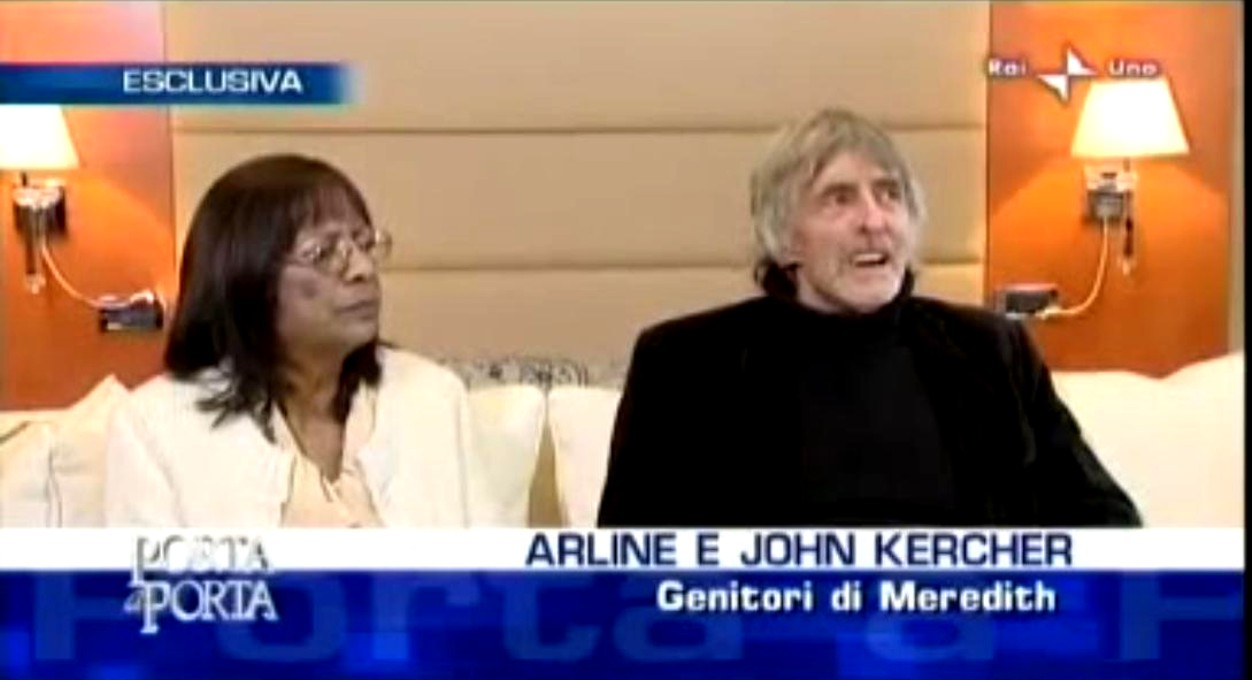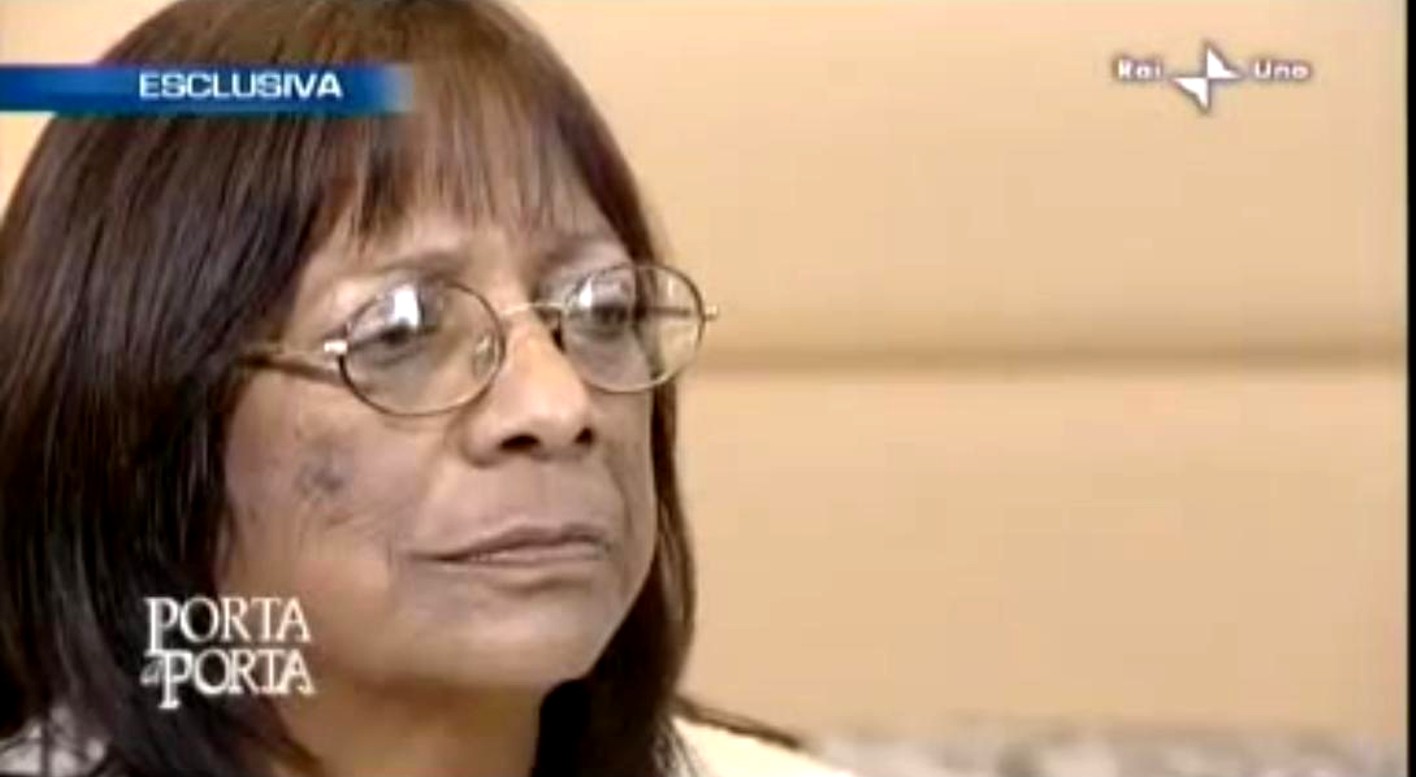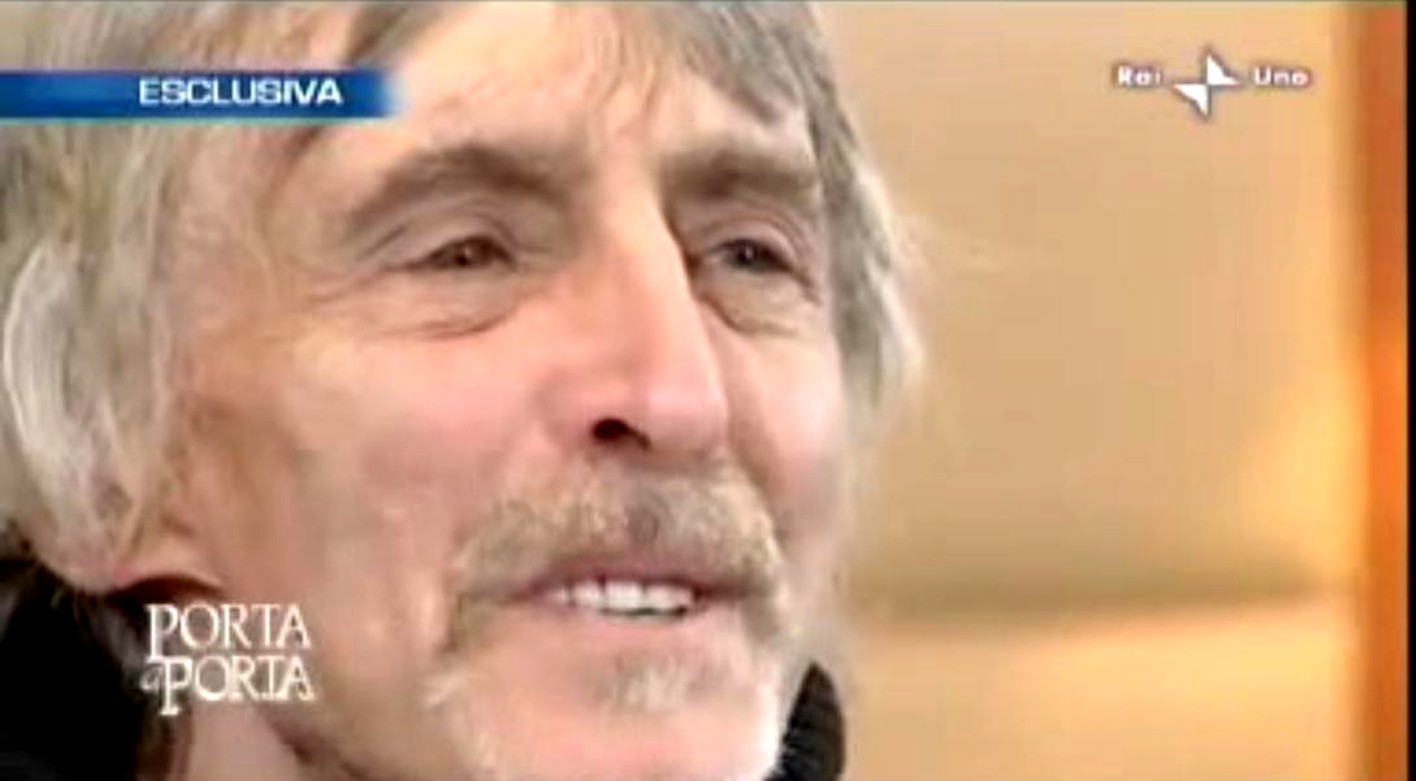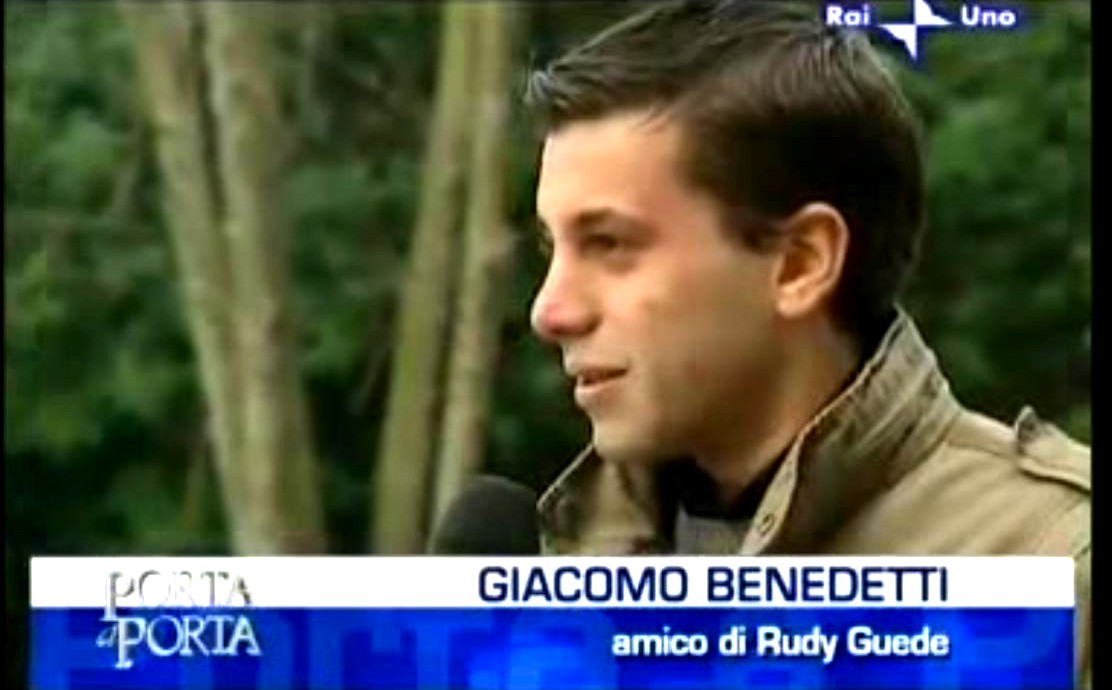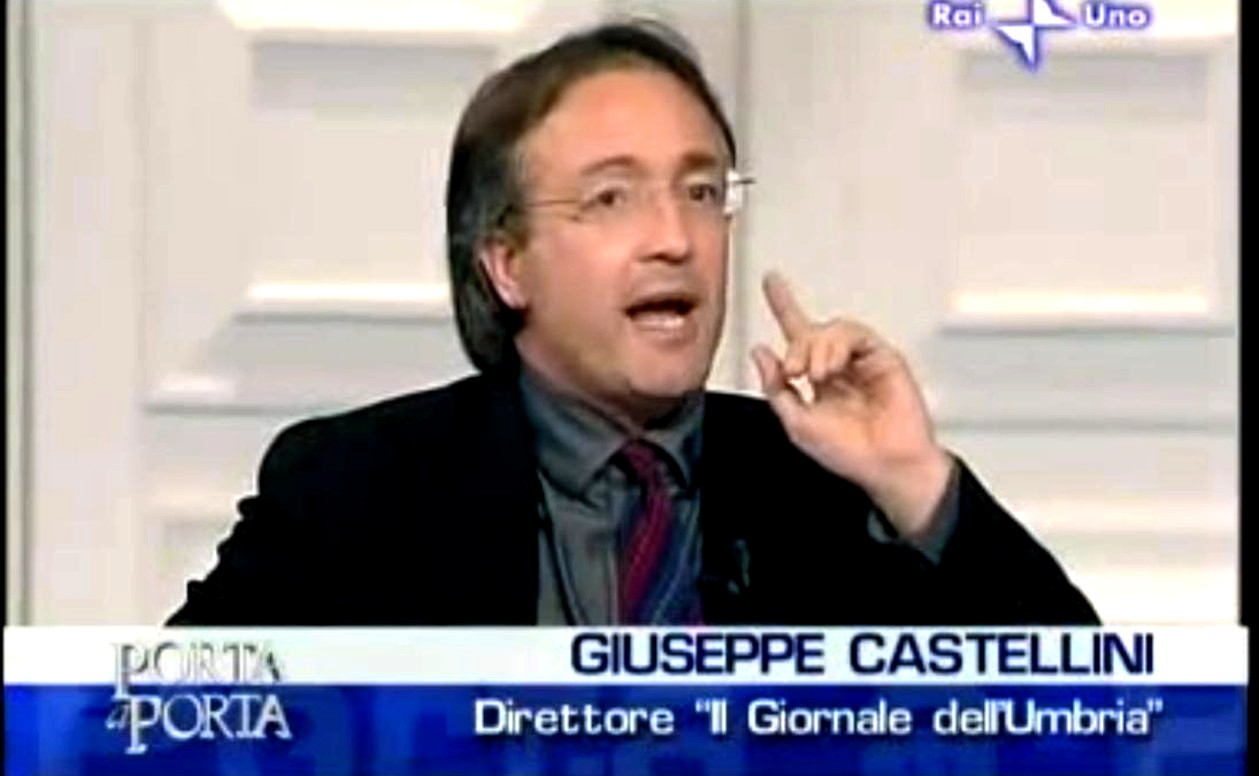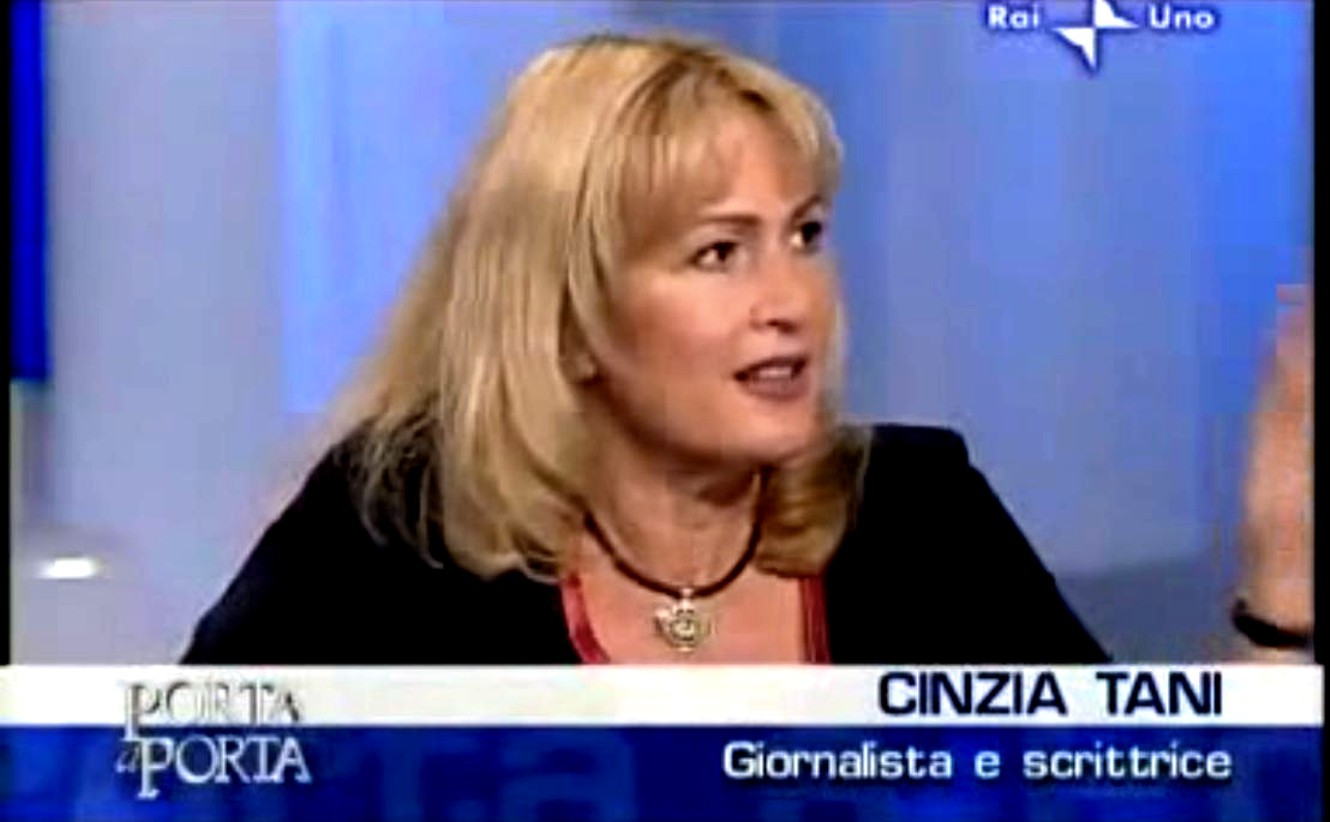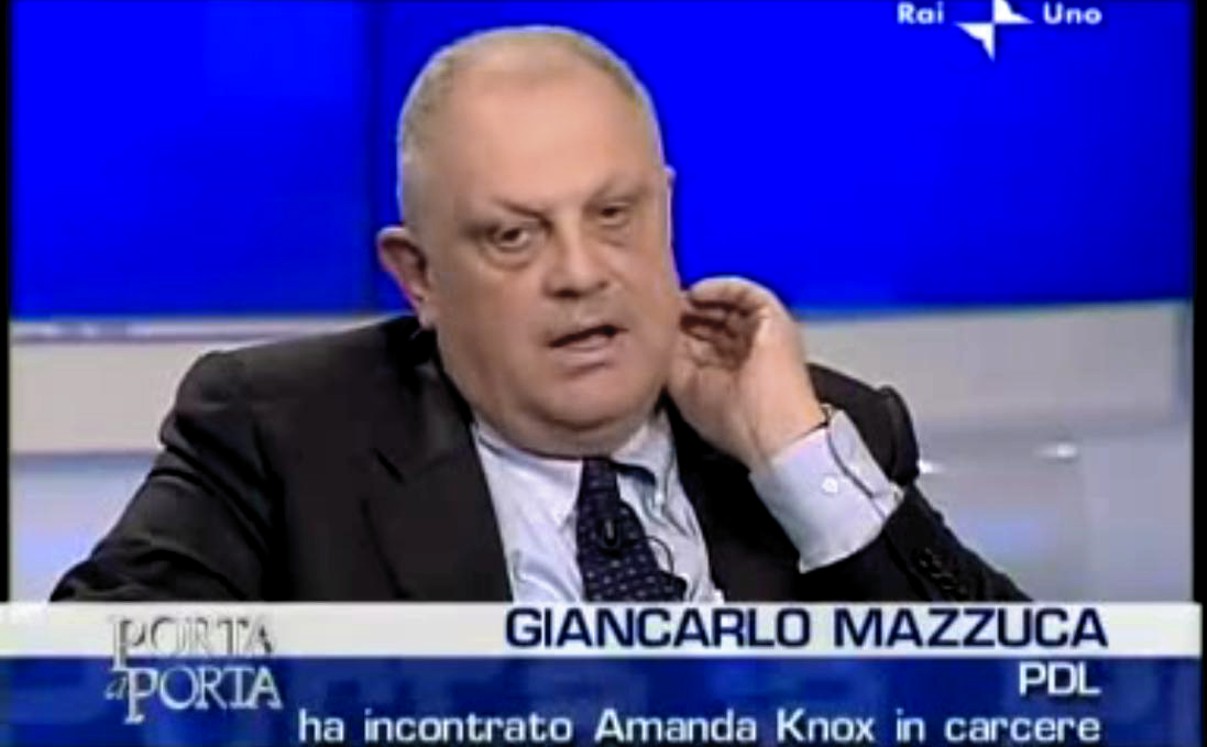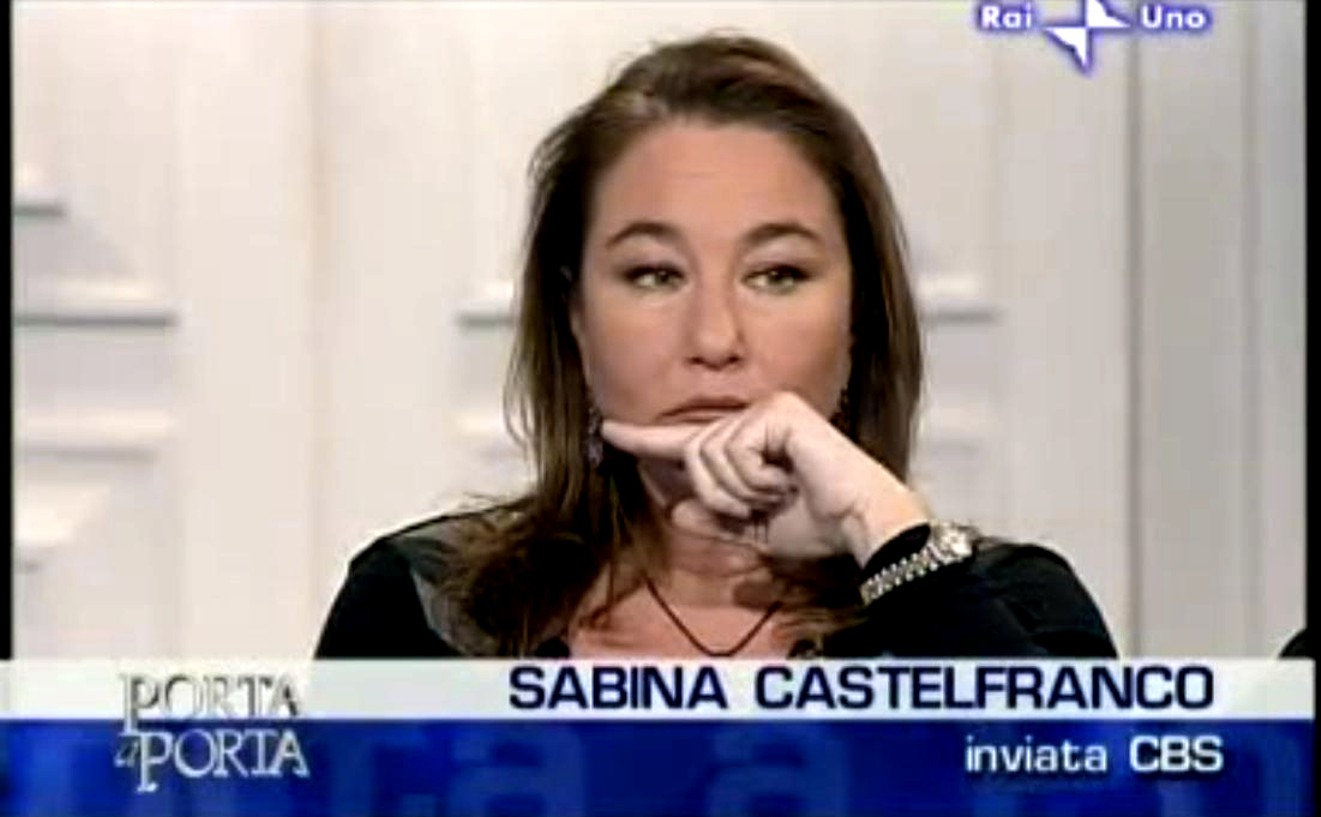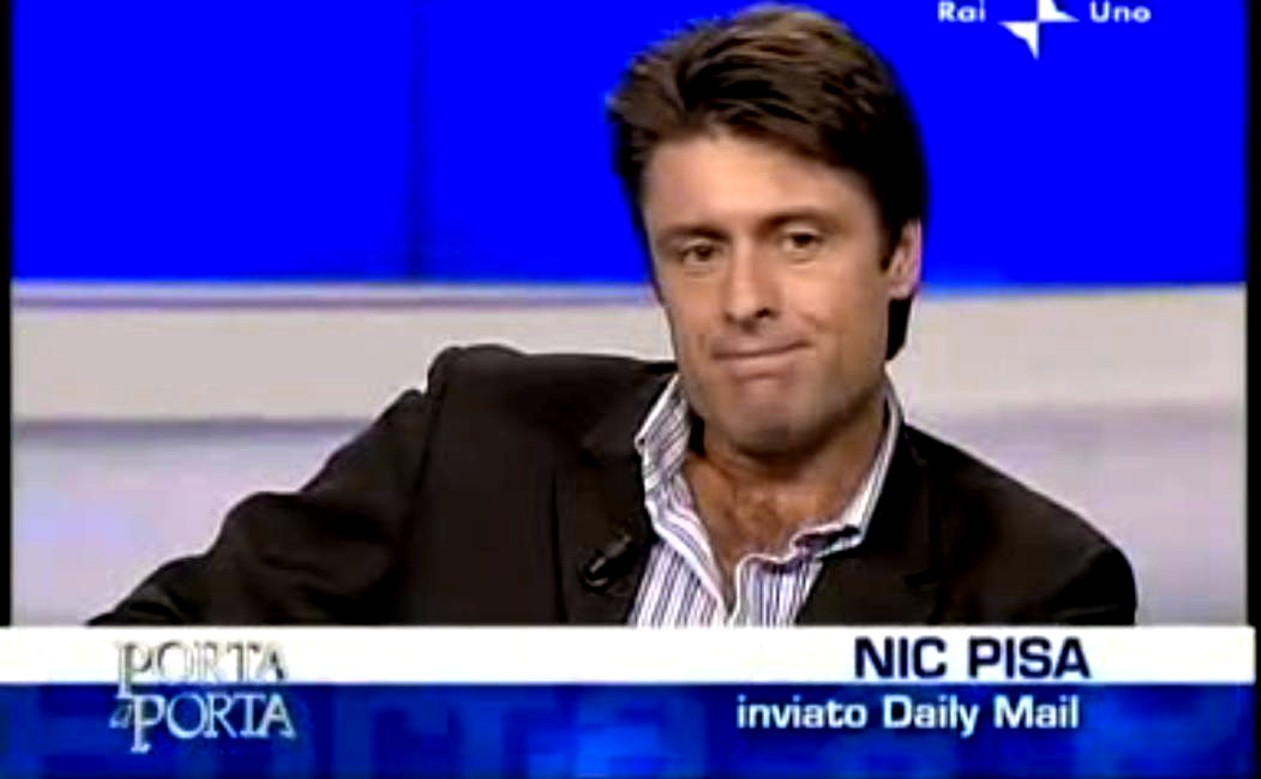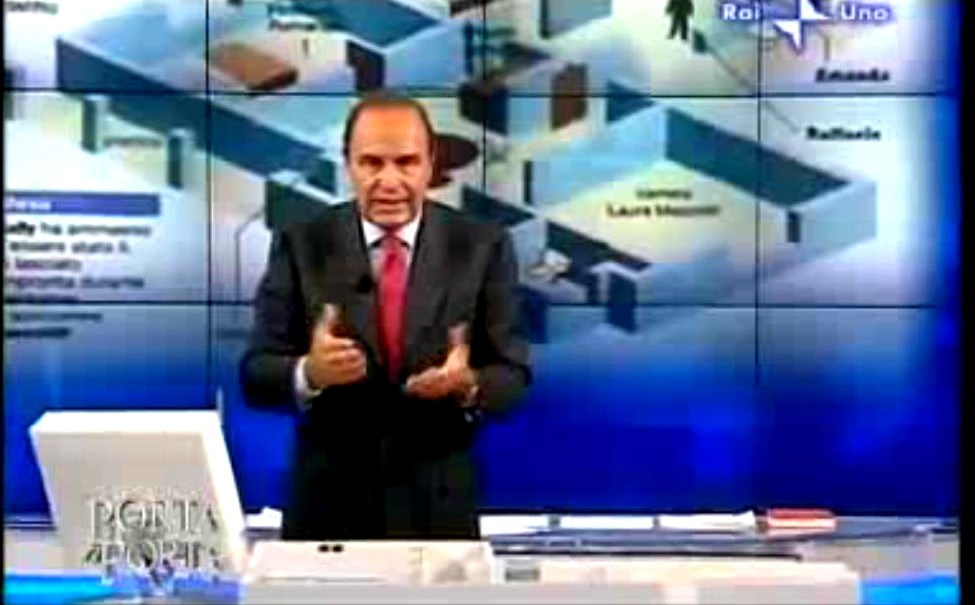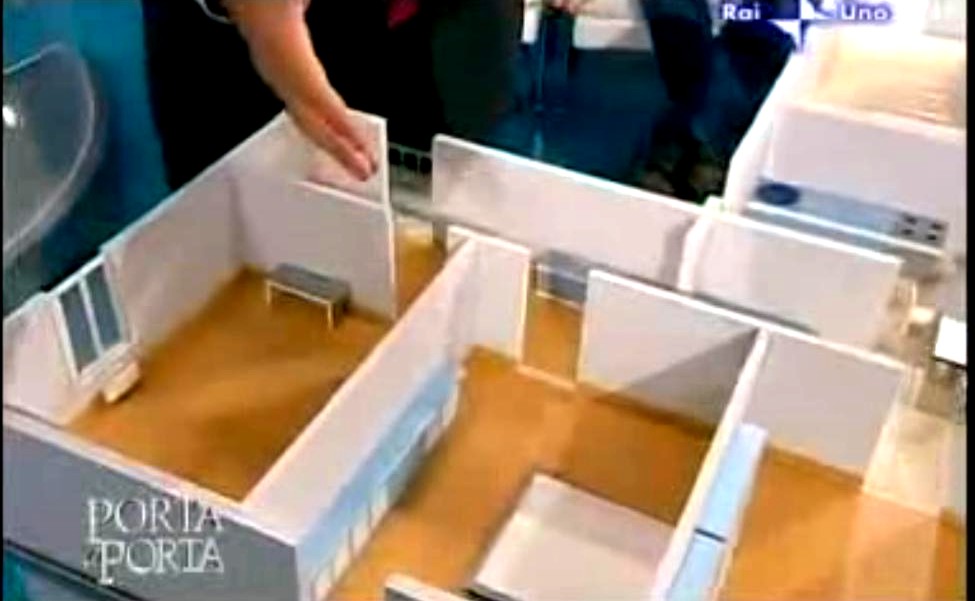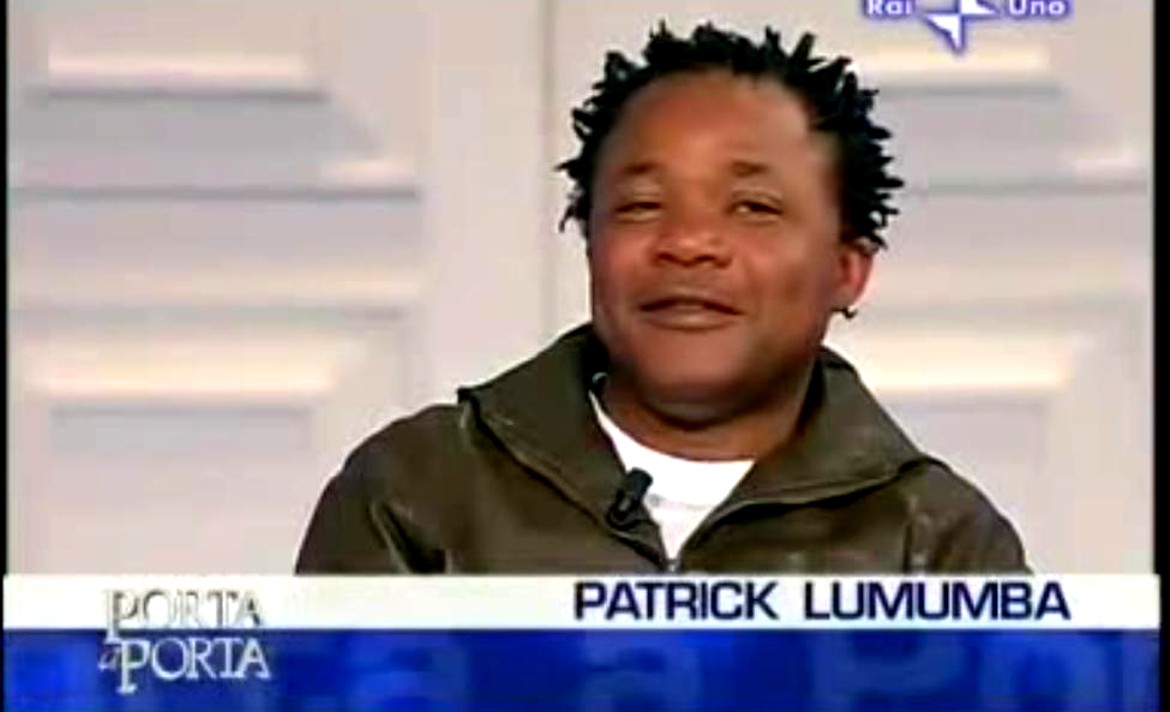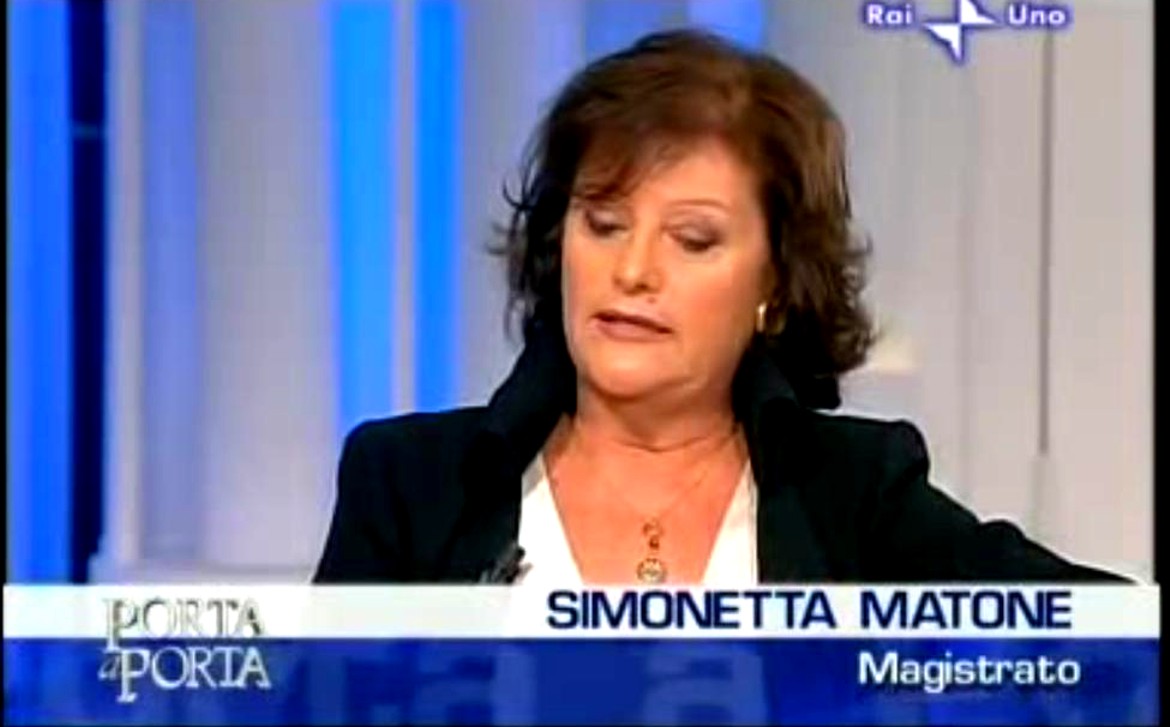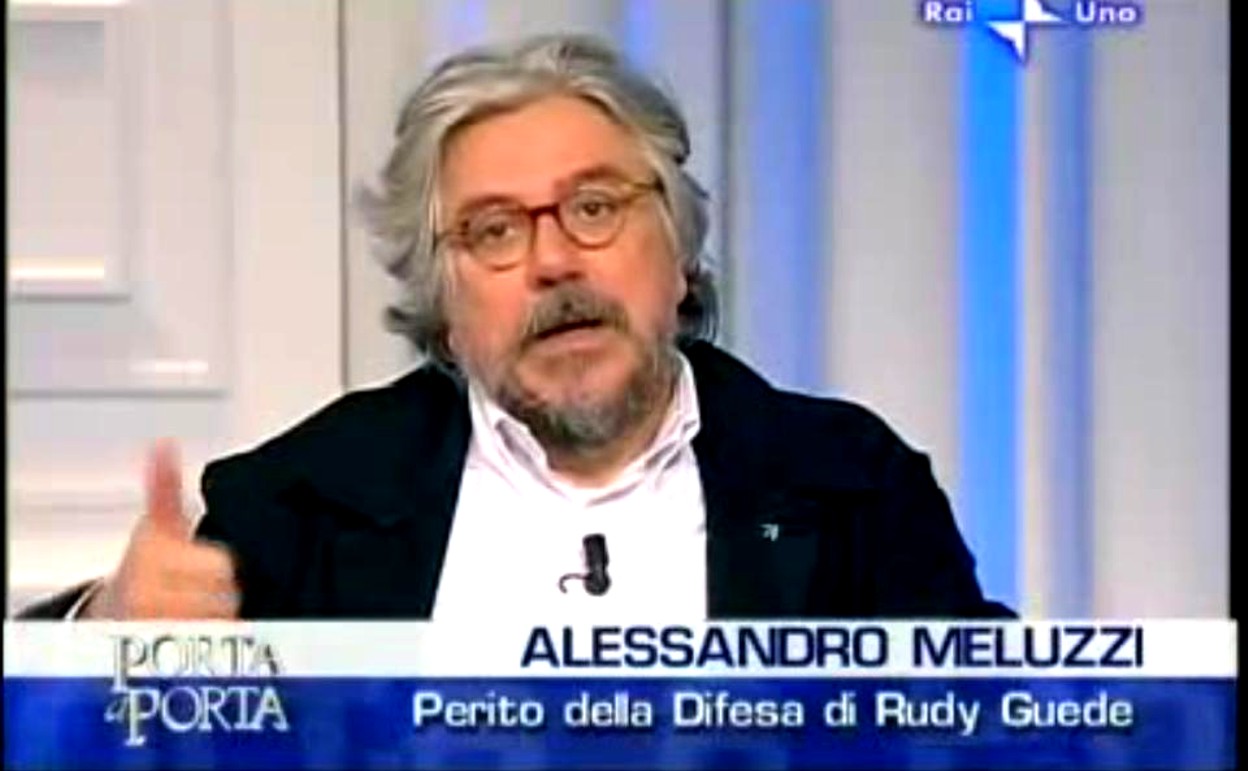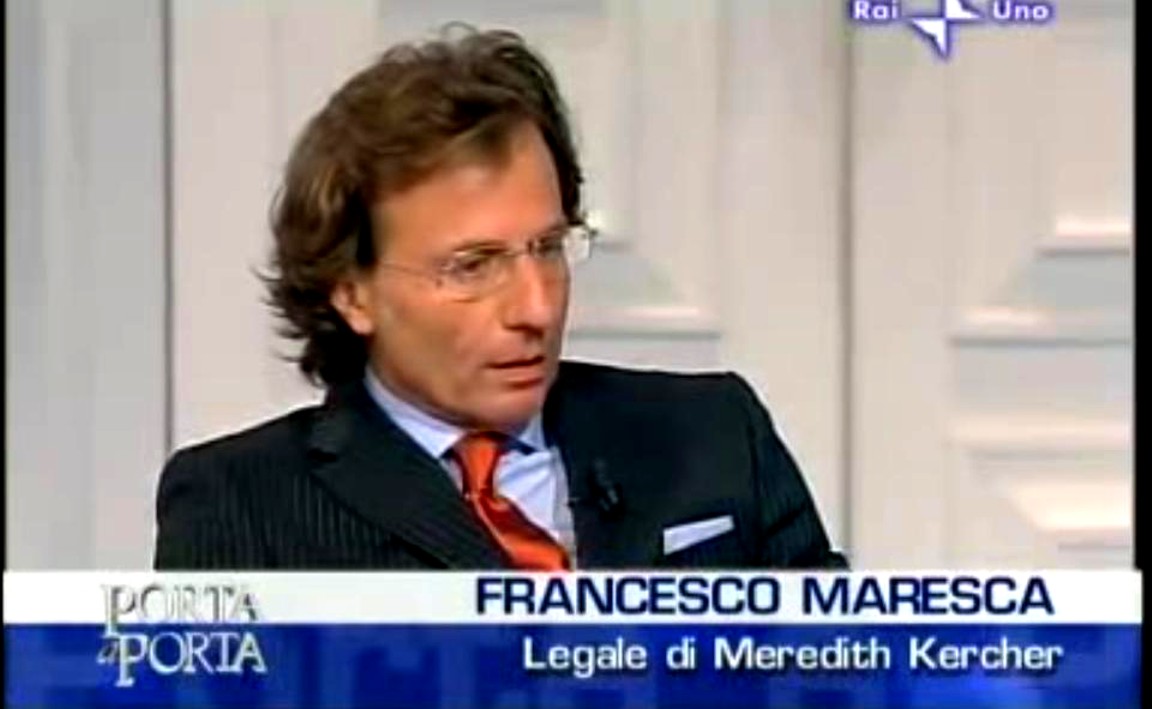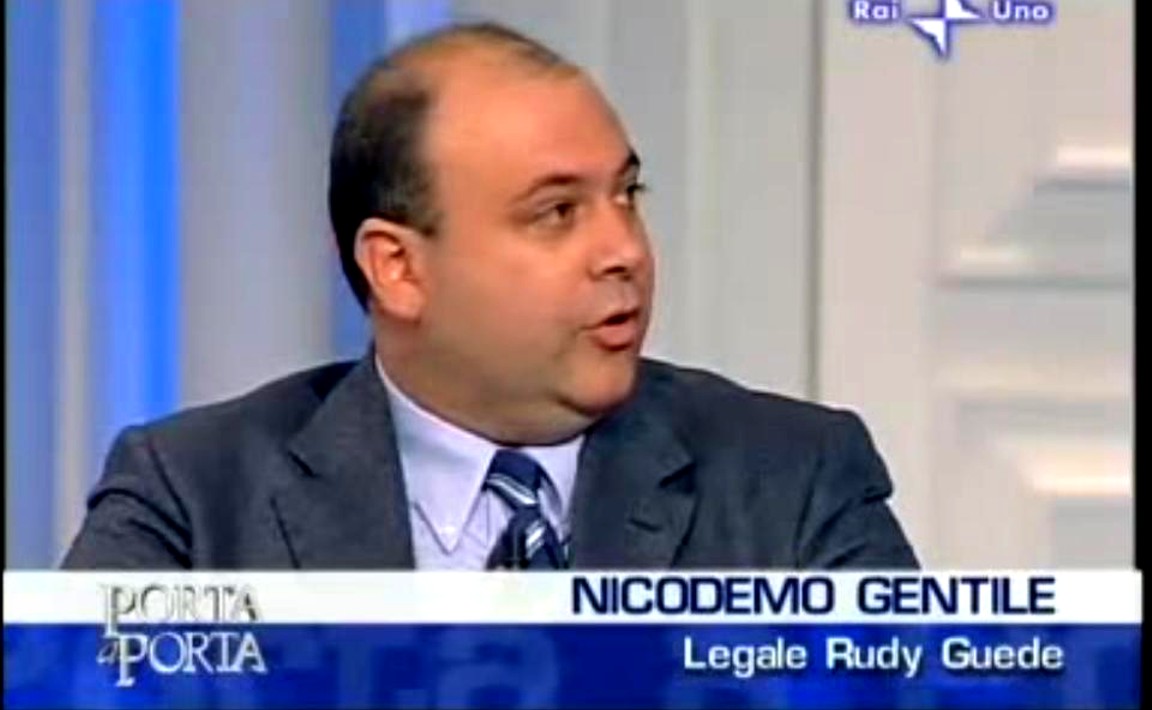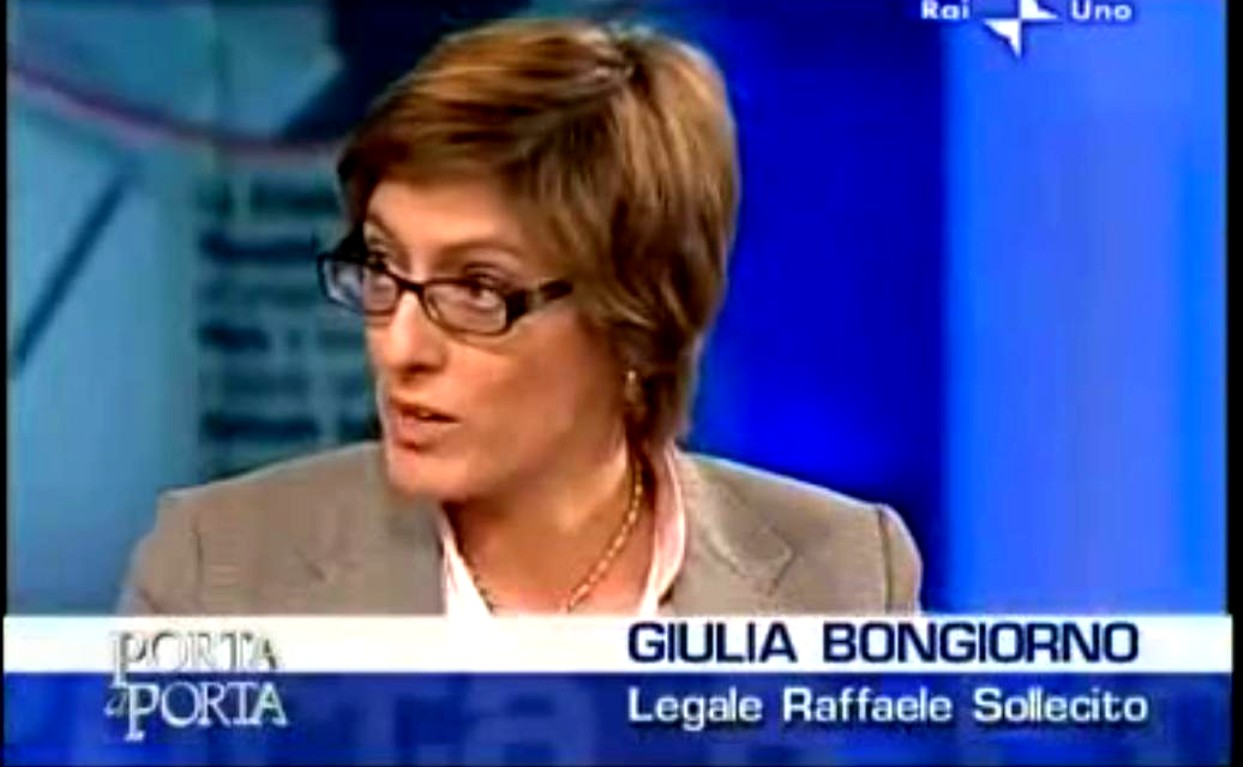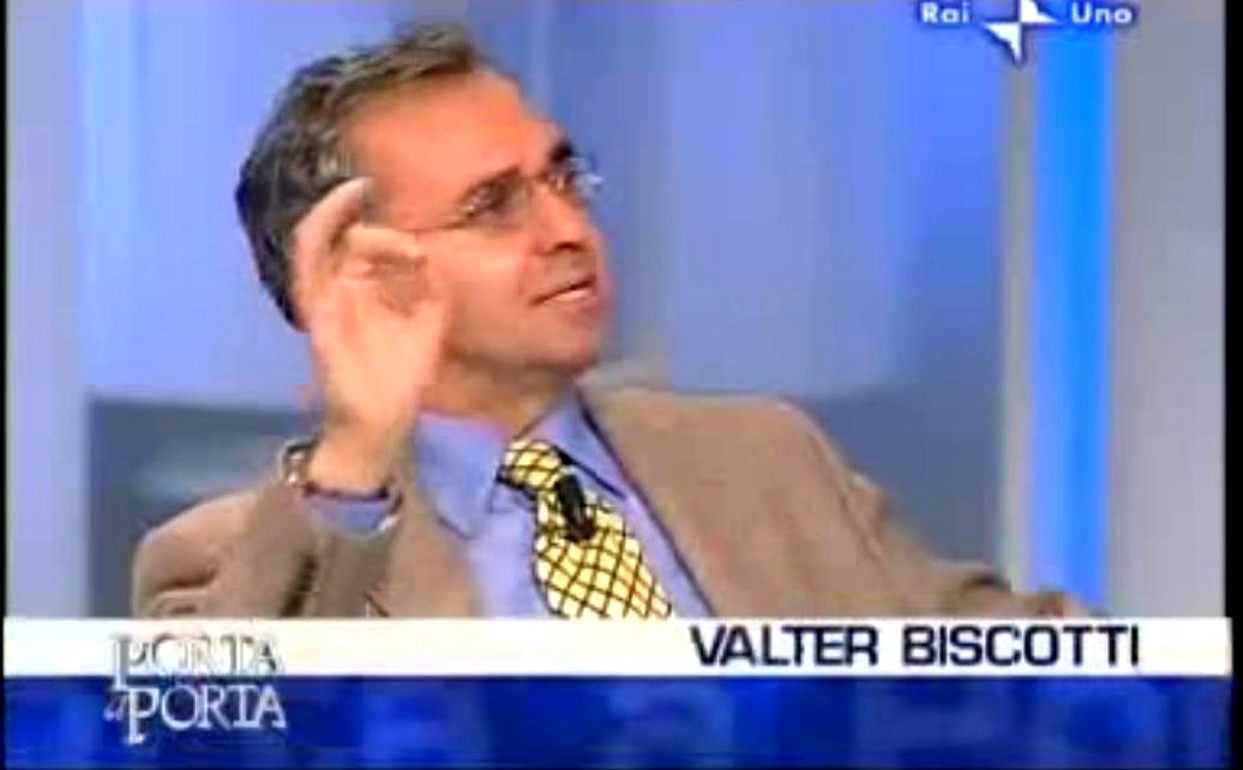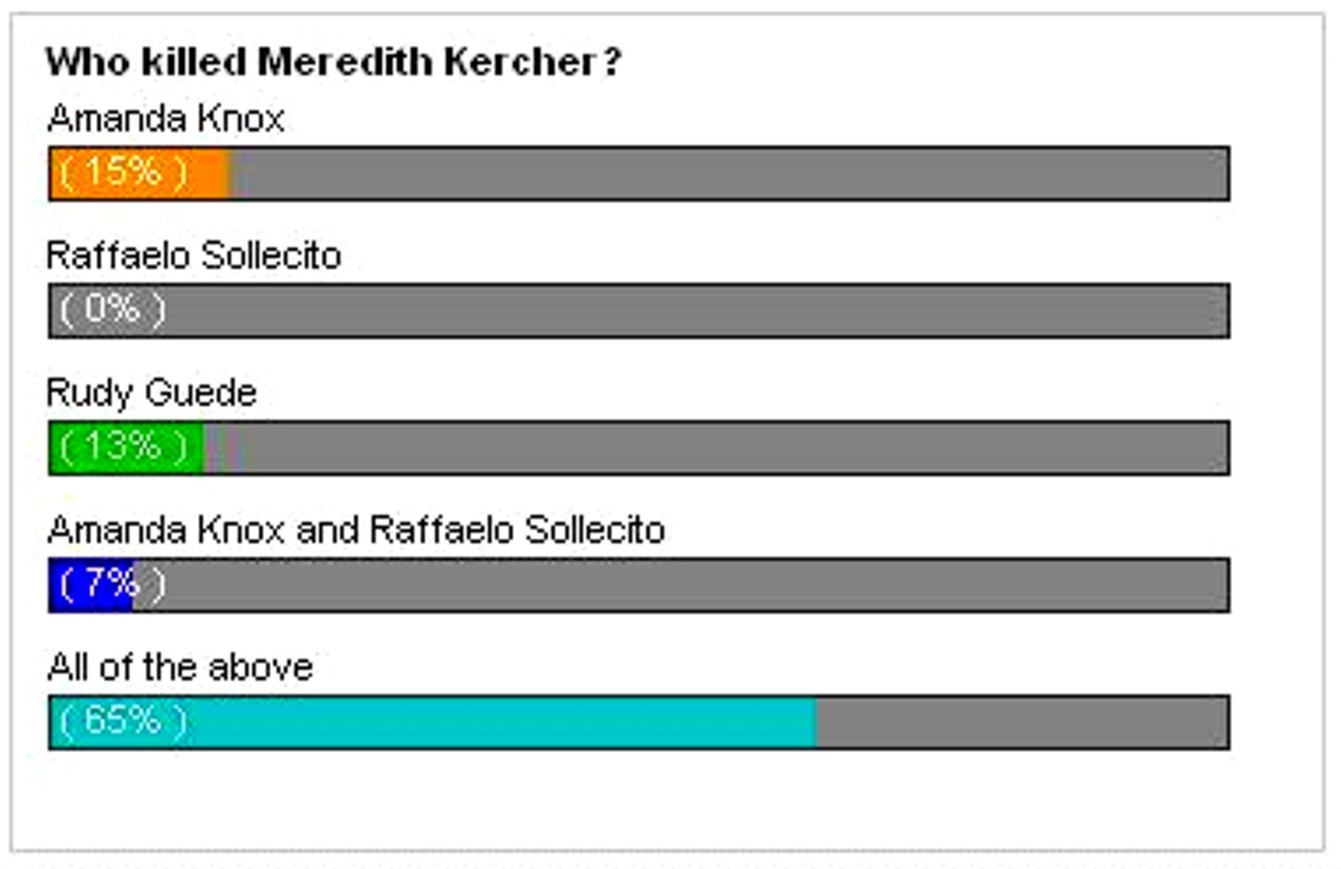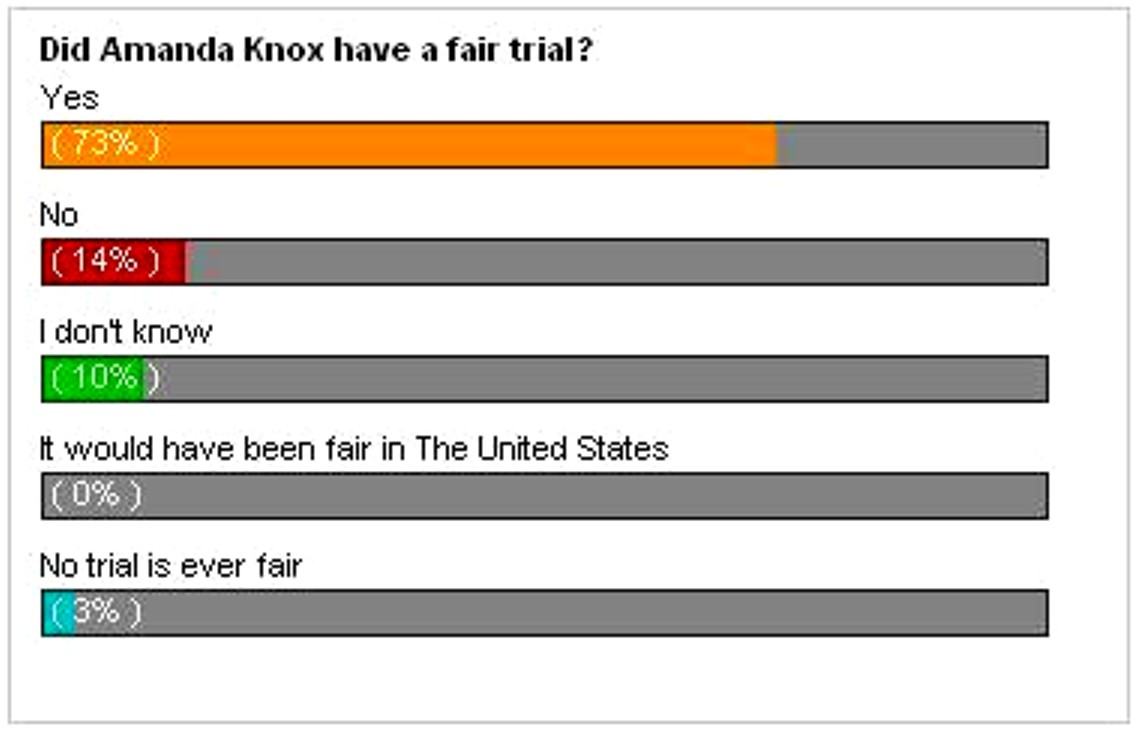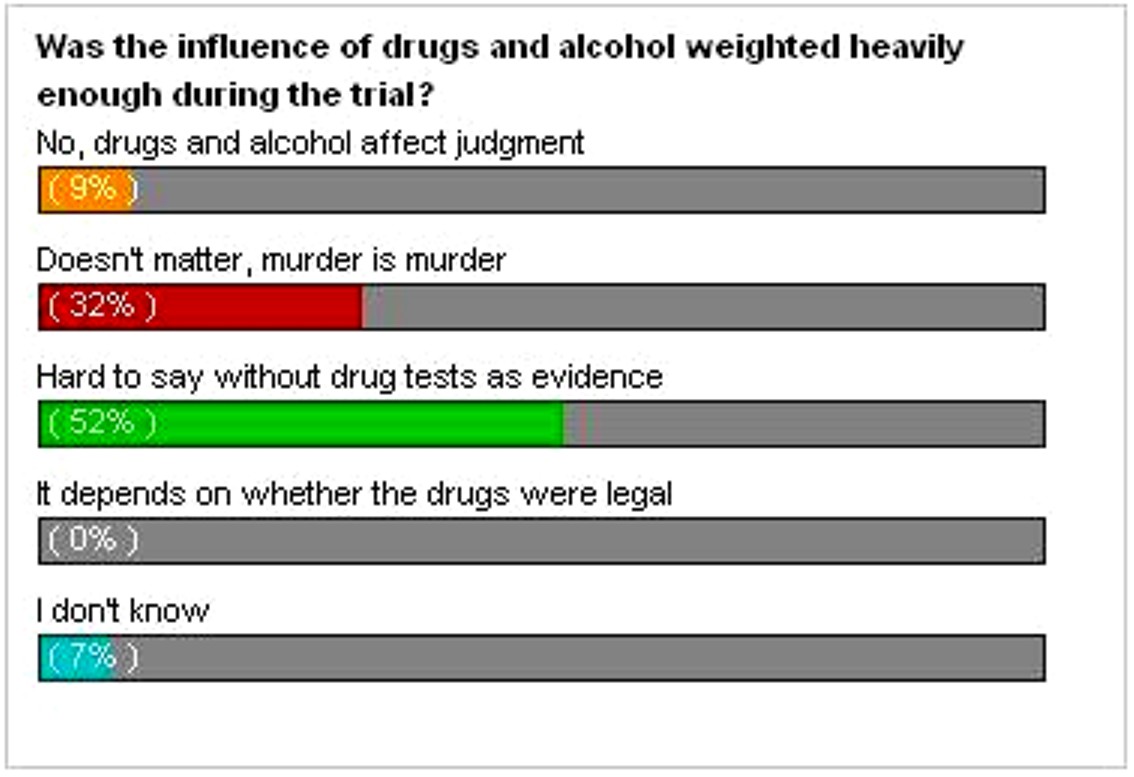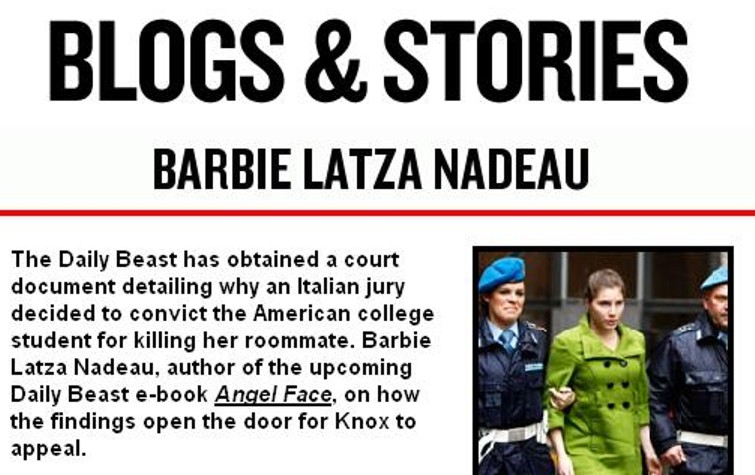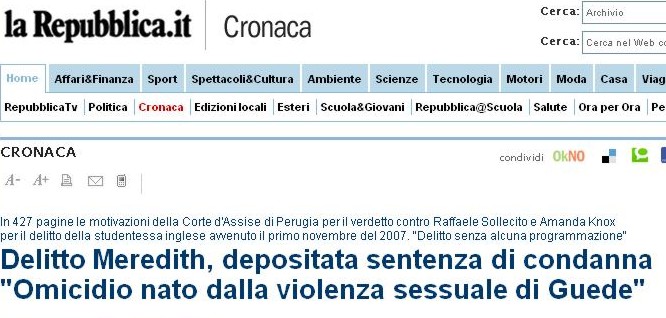
Category: News media & movies
Friday, May 14, 2010
How Each of The Three Subtly But Surely Pushed The Other Two Closer to The Fire (Part 2 of 4)
Posted by Cesare Beccaria
My previous report on this appeared here. On 12 November 2007 Guede has a first chat conversation on MS Messenger, from Germany, with his friend Gabriele.
His friend asked him why he keeps running away, and Guede answers “I can’t”. “You can’t what?” asks his friend. Guede replied “you know [why]”. “What should I know” asks his friend, but with no further reply.
Up to that moment the media knew nothing about Rudy Guede’s involvement, but he certainly felt that police were already investigating him. He knew that thus far Amanda and Raffaele had not mentioned his name.
On 15 November the investigators identify the finger print on the pillow as belonging to Rudy Guede.
On 16 November Giacomo, another friend of Rudy, was informed that Guede could have had something to do with the murder, and on the 18th he is interrogated by the prosecutor.
On 18 November Raffaele writes in his diary: “As I am thinking and rebuilding [my thoughts] I think that Amanda always remained with me. The only thing I don’t remember exactly is if she left during the evening for few minutes”.
At this point police know that Raffaele and Amanda were together at his house when Jovana Popovic arrived at 8:40PM. But they were also found together at Raffaele’s house when Jovana rang the bell in the afternoon between 5:45-6:00PM.
Why then would Raffaele say at first that he went home alone at 9:00PM, and then that “maybe it was 8:30” and Amanda was with him, and now he thinks that Amanda was with him the entire time, but he doesn’t remember if she left and, in the event that she did, at what time she returned?
Was he desperately attempting to dissociate himself from Amanda? Was he then being told to retract, but just not too much?
“I am certain that she cannot have killed Meredith and then returned home” says Raffaele. “I hope that truth emerges. None of us three [meaning also Patrick Lumumba] have anything to do with this”.
Here again we find this supposition regarding Amanda. A week before he said “It would be fabulous if Amanda hasn’t done anything” and the previous day he said: “I don’t think she’s capable of killing someone”.
What is the need of all these quasi affirmations? And why does Amanda make the exact same quasi affirmations in her own diaries?
On 19 November Guede has another chat conversation on MS Messenger, this time with Giacomo. He explains to Giacomo what had happened that evening, and that neither Amanda nor Patrick are involved.
Why does he explicitly deny Amanda’s involvement in the murder? Could he be covering up for her, since she also hasn’t ever mentioned his name up to this date?
On the same chat session, Rudy describes the aggressor as an Italian of young age. When Giacomo asks if that person was Raffaele, his reply was “I don’t know, but I think so”. He repeated “I think so” several times as Giacomo kept asking him if he was sure that person was Raffaele.
Soon after, Giacomo and Rudy started a conversation via Skype, the online video phone system. This conversation was recorded, and made public.
A couple of parts are very important. First of all, Rudy puts a lot of emphasis on the money stolen, and on Meredith being upset with Amanda. Why would he be so insisting on this matter?
Rudy adds that “Amanda never mentioned the money issue, nor did Raffaele” implying that he somehow knows this information first-hand, since it had not ever been reported in the media up to that day.
Rudy then tells Giacomo that he went to the bathroom, and heard the doorbell ring and Meredith opening the front door. Rudy adds that “It could have been anyone “¦ it could have been Amanda”.
So again he explicitly mentions Amanda. Why would he say “It could have been Amanda”?
On that same conversation Guede reads a paragraph to Giacomo from a media article mentioning the laundry, the break-in and the undressing of the victim, Meredith.
Guede says “If all this really happened, it must have been done by Amanda or Raffaele… they have done it”. Giacomo asks “Why would they have done this”? And Guede replies “Because when I left she [Meredith] was dressed”.
Giacomo says “So they killed her while she was dressed”. And Guede says: “Yes, here it says that they [clothes] were washed in the washing machine, but that’s not true. She was dressed”. And then he explains to Giacomo how she was dressed and adds: “That means that they have washed them [Meredith’s clothes]”.
Then Giacomo asks “But why did they wash her clothes if she [Amanda] has nothing to do with this”, and Guede replies “What the hell do I know”. And finally Guede adds: ” “¦ then after, from what I read, someone came back, because when I left the window was not broken. That means that someone broke it, and it wasn’t me”.
Again, here we have Rudy Guede mentioning Amanda and Raffaele. Why would he mention their names, and assume that they staged the break-in, undressed the victim, and did some laundry?
On 20 November Raffaele writes “Today they finally caught the real killer of this incredible story. They found him in Germany. But at the moment I am not 100% tranquil because I fear that he might make up strange things”.
Why would Raffaele fear that the killer might fabricate some strange things?
On 20 November Rudy is arrested in Germany. He is interrogated for the first time, in Koblenz, where he repeats the same version he had given to Giacomo on the phone, except that he does not mention Amanda or Raffaele.
During his detention he writes a memorandum in which he describes the events of the night of the murder.
This document is of extreme importance, since this time he does mention Amanda again, this time with serious threats.
First, he includes “kind words” for Meredith
To see these written in a memorandum while denying his own role in her death and failure to save her seem simply repulsive. They seem about the lowest thing that a man with a minimum of decency could ever write.
He was undeniably there when she was killed, and according to the judges he participated to the murder. His story of using an I-Pod when going to the bathroom and not hearing things and then hearing things seem simple stupidity.
Second, Guede indicates that Amanda’s story of being at the house with Patrick is not true.
He knows that Patrick has been recently released. Why then does he ask “How could Amanda have slept in that place full of blood”? Also, why is he blaming Amanda for not calling the ambulance?
Also, Rudy knew that Amanda stated that she heard Meredith screaming. Why would he tell Giacomo on Skype that he heard “a scream so loud that it could have been heard from the street”?
Third, in his writings, Rudy asks Amanda for the reason for her account of Meredith being raped. “Meredith and I just talked that night” Rudy writes. Then he adds “Say the truth, what are you hiding”.
We see here another important statement that Guede is making. Why would he be upset that Amanda said that Meredith was raped? Also, why would he want to clarify the fact that with Meredith they “just talked”?
Guede sounds as if he’s extremely upset about Amanda’s story of rape, and about the accusation of a black man. To him all this must appear as if Amanda was giving clues to the prosecutor to look further into Guede as the possibly killer.
We should note that Amanda did make a partial retraction when she states that her story could have been an imagination of her mind. But she never fully retracted her story, or her accusation against a black man.
Guede knows that Amanda’s story is not just partially but totally untrue. For this reason he writes a harsh criticism of Amanda and asks her, in a threatening way, to talk and speak the truth.
Guede is also angry about what he read regarding the staged break-in, the undressing of the victim, and the laundry, and quite probably about the evidence left intact in the toilet.
To him, the sum of these events and statements by Amanda probably looked like a direct attempt now to accuse him of the murder. “You already knew who to blame” he asks.
And then in turn he blames Amanda for the killing. “Did you hate your friend so much to the point of killing her or wishing her death?”.
All this was written as early-on as 20 November 2007.
Raffaele is also mentioned by Guede in his prison diary. He writes: “that AF, AF, could have been his name?”. Rudy adds: “what the hell happened that night. Talk and say the truth. What are you hiding. If it wasn’t Raffaele with you that night, who was it?”.
So we can clearly see that the reciprocal accusations began long before March 2008. Much less than one month after the murder of Meredith, they were already threatening one another and accusing each other.
And there’s more.
On 23 November 2007 three days after Guede is arrested in Germany, Raffaele requests an appointment with the prosecutor because he wants to clarify his position.
Mignini sets the appointment for 6 December 2007.
On 3 December 2007 Walter Biscotti, Guede’s attorney, announces on the Porta a Porta show (the most popular television program in Italy) that his client has important revelations to make, and that he “saw the killer and might be able to identify him “¦ Rudy didn’t tell me his name “¦ on his return I will show him the pictures and I imagine that he will be able to recognize him”.
But hadn’t Rudy already seen Raffaele’s pictures on the media while in Germany? Didn’t Giacomo ask him if it was Raffaele, to which he responded “I don’t know but I think so”?
On 5 December 2007 Guede meets his father in Mannheim.
According to “Il Messaggero” and “Il Mattino”, Rudy is quoted as saying: “I want to return to Italy as soon as possible and tell everything I know. I want to indicate the murderer of Meredith. I saw him and I could recognize him. Someone else was with him”.
When journalists ask Rudy’s attorney if he has seen the photos of Raffaele, he responds that all this is a matter for the prosecutor.
On 6 December 2007 Raffaele is questioned by Mr. Mignini - but he exercises his right to remain silent! Although it was he that asked to be interrogated in order to “clarify his position”.
On 7 December 2007 Guede arrives in Italy and is interrogated by the prosecutor.
Everyone is expecting Rudy to announce the name of Raffaele, but he doesn’t. He never even mentions Amanda. Rudy’s attorney tells the journalists that his client “did not give out the name of the killer because there is no name to give”.
So why did Guede announced from Germany some “important revelations” and that he saw the killer and could identify him - and then he doesn’t?
Why did Raffaele ask to be interrogated and then, after Rudy’s threat, and the day before Guede’s arrival, he exercises the right to remain silent once he sits down, face to face, at his own request, with the prosecutor?
Walter Biscotti tells the prosecutor that any “possible procedural action of recognition will be subject to subsequent interrogation” (“eventuali attivita’ processuali di riconoscimento saranno oggetto di successivo interrogatorio”).
Does this mean that Rudy is reserving the right to indicate the killer sometime in the future?
During the trial, Mr. Biscotti specifically noted that the name of Amanda Knox was not brought up by Guede only late in the day, since during the interrogation of 7 December 2007 by the GIP (the judge for the preliminary hearings) the attorney had stated that his client would be “available to provide further clarifications” right then.
Only the working schedule of the prosecutor made the interrogation slide to March 2008.
On 7 December 2007 Rudy Guede was interrogated by the GIP for seven hours, and he claimed his innocence. He explains his byzantine version of the events on the night, and he never mentions Amanda or Raffaele.
Guede says “I don’t know who the killer is and I cannot give a precise description because I was concentrating on looking at the knife”. Guede says that he heard two people talking outside the house, but he couldn’t even tell if those voices were of a male or a female.
In response to many other questions, his recurrent phrase was “I don’t remember”. He also explained his knowledge of Meredith’s missing money, which Rudy knew way before it became of public knowledge as he revealed in the conversation with Giacomo from Germany.
Amanda had previously said she had been at the house on the night of the murder, and she had never mentioned the name of Rudy, accusing instead another black man.
On 14 December 2007 Guede is heard by the Tribunale del Riesame.
He repeats that he didn’t see the aggressor because it was dark but that he could create an identikit. He confirms that two people were present, but doesn’t name Amanda or Raffaele.
The judge warns him that he must reveal the truth by telling the names of the people involved, but he refuses, saying that he never met Raffaele, and that he didn’t know Amanda had a boyfriend.
The Tribunale rejected his plea of house arrests because he was not coming clean.
A few days after his return to Italy, Guede receives a visit in prison from his friend Giacomo. During the conversation, Guede tells him that his memory was improving and that he saw Amanda at the house.
We can again see therefore that Amanda is mentioned, way before March 2008.
Guede also adds that Amanda accused Lumumba because, most likely, the assailant told her that a black man was in the house. Guede tells Giacomo that he had never met Sollecito before.
This discussion in prison took place on 7 December 2007 though it was brought out at trial only much later, through Giacomo’s testimony.
On 25 January 2008 Sollecito’s attorneys allow him or make him to say “I don’t know Rudy Guede but I am ready for a face to face confrontation with him”.
Obviously it was just a bluff.
Raffaele never talked, was never cross-examined, and was always kept off the stand. All we know about his statements was either through his lawyers or his father.
My next report appears here.
Wednesday, May 12, 2010
How Each of The Three Subtly But Surely Pushed The Other Two Closer to The Fire (Part 1 of 4)
Posted by Cesare Beccaria
Most people in Italy believe the two trials ended correctly because they have been exhaustively reported-to throughout.
Also they have been able to follow the machinations and the twists and turns of the three defendants and defenses in real time. And the court documents and transcripts are all issued in Italian, and some are officially posted on the Internet.
The media coverage in Italian in Italy exceeds the media coverage in English in the UK and USA by a factor of five or ten. And there have been a number of very highly rated and balanced TV talk-shows on the case, in the course of which the defenses were not able to muzzle or slant the discussions - even if they ever considered doing such a thing.
These TV talk-shows on the case have included the most prestigious of all such shows in Italy, Porta a Porta, which offered hours of discussion by all the legal players except for Amanda Knox’s team in December 2007, October 2008, February 2009, and December 2009.
The Porta a Porta discussions are at various points referred to here, and the images used here are from those shows.
This is a four-part analysis, based mostly on Italian-language sources, of the many twists and turns of each of the defendants (as they then were) and their defense teams when intent on giving themselves an edge while often slyly selling out the others.
This interplay has been evident almost as much between Knox and Sollecito and their teams as it has between either of them and Rudy Guede, though rather less hostile.
It is worth pointing out two things up-front. First, that this is still far from played-out, more twists and turns can be expected, and we still might see the complete flying-apart and separation of all three. And second, that public maneuvering like this by three people accused of a crime is REALLY unusual and there have been few real precedents. This behavior sure is not typical of innocent parties.
So to begin…
“Guede has kept quiet for as long as he could” said the Court of Appeal in its recent motivation report “because, given the deep connection of the events, accusing Amanda and Raffaele would have exposed him to their very probable retaliation”. (“Guede, finché ha potuto, ha taciuto, poiché, stante la profonda connessione degli eventi, accusare Amanda e Raffaele lo avrebbe esposto a più che probabili dichiarazioni ritorsive da parte di costoro”).
This phrase in boldface is extremely important in understanding the connection of the three actors to this horrible story.
Their attorneys have done an excellent job so far (the best they could) and will continue on appeal to try to convince the judges of their innocence, or at least for a substantial reduction of their sentence. Rudy Guede’s attorneys have already obtained what they needed. He will probably be out on parole in less than five years now.
The other defense have played a very delicate game in this trial. From the beginning, they could have asked for a finding of “preterintenzione” (a sort of non-intentional second-degree murder). But this would have forced their clients to admit the truth without the certainty of the judicial outcome. Hence they opted for the not-guilty plea.
Their first strategic action was in each case (RS and AK) to stop the damages that their clients were inflicting upon themselves with their statements.
The next strategic action was that of not appearing at the lab for the non-repetitive testing for the DNA, with the obvious intention (almost habitual in Italy) of refuting ex-post each and every forensic finding that could have been adverse to their client.
The third strategic action flowed from the major problem all the attorneys were facing in defending their own client: the risk of reciprocal retaliation. Like concentric circles, they all came to share a gray area that was tacitly considered off-limit for everyone else, like a haunted house that no one else dared to enter.
At first, this tacit accord was respected. But when various defense necessities emerged, the breaching of the accord began. The process was gradual but inexorable, leading to two brief but clear breaches: Guede’s explicit accusations against the other two in March 2008, and reiterated right after the disgraceful intrusion on the scene of Mario Alessi earlier this year.
This tactic was observed by the Appellate Court that heard Guede’s appeal. In their recent motivation report.
The judges reprehended all three offenders by stating that all three should have explained what had happened in that house on the night of the murder, “at least for a sense of human compassion toward the poor victim” and that instead they had “preferred to cram their statements (made on several occasions) with lies, reticence, half-truth, allusions, improbable occurrences and by more or less veiled reciprocal accusations”. (“Gli imputati hanno invece preferito infarcire le loro dichiarazioni, rese in diverse occasioni, di bugie, reticenze, retromarce, mezze verità , allusioni, prospettazioni inverosimili, accuse reciproche, più o meno velate”).
Rudy Guede was questioned in Koblenz, Germany, right after his arrest. He was also interrogated on December 7, 2007 and on March 26, 2008, and made spontaneous declarations on May 15, 2008.
At first he did not formally accuse anyone, and he remained very vague about his accomplices. He chose to go on trial first and so he had a slight advantage over the others.
Rudy Guede is undoubtedly a compulsive liar. He told his version of the events to perfectly fit his case, and adjusted his inconsistencies according to the changing development of events.
He first says Meredith was killed around 21:20 and then his attorneys made him change the time to 23:30. According to his absolutely improbable account, he met with Meredith at 21:00 and within TEN MINUTES they managed to talk about her mother’s health, go around the house looking for the missing money, had oral sex, and then suddenly had an urgent need to go to the bathroom. Then he puts his I-Pod on at high volume while doing his business in the bathroom of a girl he barely knew.
In this implausible story, Guede doesn’t explicitly name his accomplices. Amanda and Raffaele also told their fair share of lies, but at the beginning they didn’t directly accuse Guede either.
Things changed when the various attorneys started to slowly penetrate inside the off-limit zone.
Guede’s memory began to function as the lone-wolf theory was materializing. Apparently the volume of his I-Pod was not loud enough now to impede him from recognizing Amanda’s voice. His vision became clearer and he began to recognize her silhouette from the window and the identity of the aggressor.
The more Knox and Sollecito’s attorneys were elaborating their theory to reinforce their defensive strategy, the better Guede’s memory became. Every time allegations of the sole killer emerged, Guede’s attorneys were ready with their rounds of ammunitions, needed to keep the other attorneys at bay.
Now, if we take a closer look at the chronology of events, we can observe a possibility that has been largely overlooked but is of extreme importance.
Maybe the staged break-in was not necessarily made with the intention specifically to frame Guede. (Judge Micheli actually advanced this notion, as Amanda and Raffaele most likely had no knowledge of Guede’s earlier break-in in Milan.).
And yet it is without doubt that some one person or several persons intentionally tried to mislead investigators and with a good degree of certainty these people took also part in the crime. And for obvious reasons Guede was not among them during the staging and the cleaning.
Let us now look more closely at the chronology of the events in order to understand why it is clear that Guede did not act alone. Also to see that he did mention Amanda and Raffaele way before the interrogation of March 2008. We can also observe how the three defendants have tried in various ways to accuse each other from the very beginning, through their voluntary statements and through their “prison diaries”.
It should be noted that it is highly unrealistic that lawyers let their clients write “prison diaries” without their consent, especially after all the lies and inconsistencies they have told to police and prosecutors until they took over. Those “prison diaries” sound anything but spontaneous.
Raffaele changed his versions of the events at least three times. At first he confirms Amanda’s original deposition. But then, under interrogation on 5 November he admits to having spoken rubbish in his previous statement, because, he claimed, Amanda convinced him of her version and he didn’t think of the inconsistencies. And that he went home alone around 9:00 PM, smoked a joint, ate and surfed the net, and finally Amanda returned at 1:00 AM.
Amanda then is told by police that Raffaele had just blown her alibi. But instead of refuting Raffaele’s statement, she immediately takes the opportunity to accuse Patrick Lumumba, adding that Raffaele was probably with her at the crime scene.
Let’s now look at Amanda’s statement given to police on 6 November 2007.
Amanda writes: “I know that Raffaele has placed evidence against me, saying I was not with him on the night of the murder “¦ there are things I remember and things that are confused “¦ what happened after I know does not match with what Raffaele was saying”. Amanda goes on to explain what happened at Raffaele’s house in a very confusing way and with many “perhaps”, I’m not sure” and “I don’t remember”.
She goes on to write: “my boyfriend has claimed that I have said things that I know are not true “¦ I never asked him to lie for me “¦ What I don’t understand is why Raffaele would lie about this. What does he have to hide? I don’t think he killed Meredith but I do think he is scared, like me. He walked into a situation that he has never had to be in, and perhaps he is trying to find a way out by disassociating himself with me”.
She adds: “I also know that the fact that I can’t fully recall the events that I claim took place at Raffaele’s home during the time Meredith was murdered in incriminating”. Raffaele as well states that he cannot recall precisely what he did at his own house that evening.
Amanda remembers that she noticed blood on Raffaele’s hand, “but I was under the impression that it was blood from the fish”. Amanda then asks: “is there any other evidence condemning Patrick or any other person. Who is the real murderer?”
A week later, when the knife was found, Amanda goes even further. She now wonders if Raffaele could have killed Meredith and then put the knife-handle in her hand while she was sleeping. “Was Meredith’s DNA on the knife?” Raffaele had asked “Maybe, because one time I accidently pricked her”.
“It’s impossible that Meredith’s DNA is on the knife”, says Amanda, “because she’s never been to Raffaele’s apartment. So unless Raffaele decided to get up after I fell asleep, grabbed said knife, went over to my house, used it to kill Meredith, came home, cleaned the blood off, rubbed my fingerprints all over it, put it away, tucked himself back into bed, and then pretended really well over the next few days, well, I just highly doubt all of that”.
Doesn’t all this sound like a reciprocal veiled accusation? Why would two people accused of murder, with exactly the same fate, write down their doubts about the innocence of their presumed accomplice? Why doesn’t Amanda mention Patrick or Rudy at all in her diary?
On 7 November 2007 Raffaele Sollecito begins writing his own diary. His most recurrent phrases are “I don’t remember”, “maybe I did this, maybe I did that”. The prosecutor has already reminded him that he has given three different versions of his story, in particular about Amanda. He is still not sure if Amanda left the house, and if she did he now doesn’t remember how long she was out for. “Why don’t they investigate on her”, he asks.
On 11 November 2007 Raffaele recalls that someone told him that on the morning of November 2 Amanda went home to take a shower and then went to a public laundry with some Argentinean guy and he put a pair of blue Nikes in the washing machine.
“All this makes me totally lose faith in Amanda, after she keeps on lying”, Raffaele writes. Adding that “I know little of her, but although I don’t think she’s capable of killing someone she could be capable of lying in order to hide the fact that she has relations with [hangs out with] disreputable people”.
We note here Raffaele saying: “I don’t think she’s capable of killing someone”, while a few days before Amanda wrote: “I don’t think he killed Meredith”. Why would they both have the need to make such conjectures? It is very unlikely (if not impossible) that lawyers would allow them to make any written statements, including diaries, without their consent.
Raffaele goes on to write: “I worry about two things: if Amanda that night remained with me all night, we might (although that is a very remote hypothesis) have made love all evening and all night, stopping only to eat. That would be a mess because there would be no server connections during those hours.” (How can a twenty-three years old boy not remember if he made love “all evening and night”?). Four days earlier Amanda wrote: “perhaps I made love to Raffaele. In fact, I think I did make love with him”.
Raffaele’s second worry is that “Amanda could have stolen my knife and gave it to the son of a bitch that killed Meredith, although even this hypothesis sounds like science fiction, but possible, therefore I am not at ease.”
Amanda writes in her diary that the encounter in prison with a nun made her memory function all of a sudden.
She says: “In my cell I was waiting for an answer to come to my head when a sister arrived at my door. She told me to be patient because God knows everything and would help me remember the answer “¦ and then it hit me. Everything came back to me like a flood one detail after the other “¦ I cried, I was so happy. I wrote everything I could remember and an explanation for my confusion previously “¦ Police think that I’m involved “¦ But now at least I know it’s not true. I remember what I did that night and there’s no way that they can prove that I was there, in Meredith’s room”.
“They really think I’m involved and its sad, because it means they still have no idea what happened. They really don’t know who killed my friend”. Then she continues to ask herself why Raffaele is lying, what is he afraid of.
This reciprocal accusation of lying is also repeated. We will see that in his diary Rudy also accuses Amanda of lying. Why do they constantly accuse each other of lying? And why do they also insist on the recurrent phrase: “what are you hiding”?
On 12 November 2007 Raffaele gets 90% of his memory back.
He says: “I am 90% sure that on my second declaration I said rubbish”, and that his first version (that Amanda was with him) is the right version. It should be noted that in his second police interview he said the exact contrary, stating that his claim that Amanda was with him was rubbish.
Now Raffaele changes his story again and adds: “the fact that Amanda induced me to tell her version is rubbish “¦ I’m realizing that probably Amanda was with me all night, without ever leaving. And I am certainly not the one that lies in order to help the investigations and put everyone in trouble. On the contrary, it would be fabulous if Amanda hasn’t done anything”.
The memory loss claim now surfaces. Raffaele adds: “I realize that if we all ended up in jail is also my fault regarding the facts of that evening and also because me and Amanda smoked many joints.” “I lived in weightlessness an event that I could not believe it could have been real”. Raffaele is basically saying that it’s also his fault if he cannot remember what happened that night. As we have seen, Amanda wrote something similar when she acknowledge that her lack of memory could be “incriminating”.
Not only Raffaele, but also Amanda and Rudy have this mysterious amnesia on the events of that evening. All three of them don’t remember well. All imagine that certain things happened “¦ but maybe not. No one is able to recall even the most impossible things to forget (was it Raffaele the aggressor with the knife? Was Amanda home with Raffaele? Was Amanda at the cottage with Lumumba? Was Raffaele with her? Did they really make love all night?).
My next report appears here.
Tuesday, May 04, 2010
From The Book Darkness Descending: The Insights On Rudy Guede
Posted by Peter Quennell
Above and just below: Abidjan, the very attractive West African city where Rudy Guede was born and where he lived until he was five.
Darkness Descending includes this well-researched and revealing portrait below of Rudy Guede and the two traumatic experiences that really threw him: his moving in with the Caporali family, and the collapse of the restaurant in northern Italy which briefly employed him.
No claims here about Rudy Guede being a drifter or drug-dealer or dangerous knife-wielder or petty criminal.
None of those things are confirmed by the record or the Micheli report, and few or none in Perugia or Italy generally seem to believe Rudy Guede was the sole perpetrator or even the main perpetrator of Meredith’s death.

(Above: the downtown of Abidjan, the economic and former political capital of the Ivory Coast)
From Darkness Descending by Paul Russell and Graham Johnson (Pocket Books) pages 292 to 296
Unlike Amanda and Raffaele, the background of Rudy Hermann Guede seemed to inspire a degree of sympathy in readers and viewers.
At least once the undercurrents of reactionary racism had run its course and readers were able to identify with Guede the individual.
Guede had been dragged up a virtual orphan. He seemed to be luckless, directionless, prone to following others into trouble, his carers said. He’d never had a paternal figure to look up to or guide him.
That, and the fact that once he’d been caught he seemed to be at least trying to tell the truth about his involvement with Meredith, gave him a certain credibility.
He was often given a fair hearing in the papers for not trying to evade guilt by changing his story. Editors and readers seemed to appreciate that he had not relied on high-powered family connections to duck out of one of the most tragic cases that had ever come before them.

(From Piazza Italia at the south end of the walled city - Rudy Guede first lived off there to the south-east)
Guede came to Italy in 1992, when he was five years old. His father Roger had emigrated from the Ivory Coast a few years before at a time when the Italian economy needed new manpower to fuel the country’s post-industrial boom…
Roger Guede had trained as a teacher in the former capital city of the Ivory Coast, Abidjan, where his wife still lived with little Rudy, but in Italy he found work as a bricklayer.
Life was hard because of exploitation, denial of workers’ basic rights and rampant illegal labour.
After five years he was granted a regular resident’s permit and returned to Abidjan to his wife, to see if he could take the young Rudy back to Italy with him. She agreed that in Italy he would have a chance of a better life.
Roger and Rudy found a flat in the shabby low-lying suburb of Perugia called Ponte San Giovanni. The neighbourhood was not at the top of the hill, with its wide vistas, ancient buildings and air of academia.
Roger’s life had no room for aspiration or fanciful gap-year adventures. He settled for a seedy new-build on the valley floor near the railway station. An unhealthy stream meandered through the projects like a sewer.
Still, it was better than the shanty town where Rudy’s mother was eking out a bare existence.
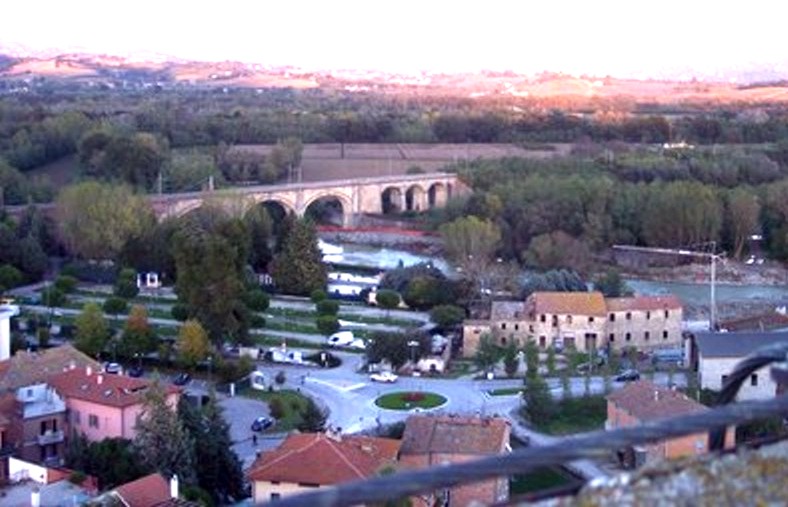
[Shots here and just below of Ponte San Giovanni, the town just to the east where Guede first lived]
New to immigration, Italy’s attitude to race relations has often been schizophrenic. Far-right extremists have been known to whip up dissension. But in Perugia, a small community like many that made up the backbone of Italian society, Roger and his son were welcomed.
His presence stimulated the lively cutiosity of Italians, not their hostility. The kindness of his neighbours and the willingness of social services to offer him childcare were proof of that, and he was free to hit the road to find building-site work.
During these absences Rudy was fostered by local families. One of his first full-time carers was a Mrs Mancini, who had been his maths teacher at school. She never lost interest in him and was to be like a second mother.
Rudy also struck up a lifelong friendship with her son Gabriele and another schoolmate, Giacomo Benedetti. The fabric of a closeknit Italian working-class community felt like a protective cloak and Rudy thrived.
His teachers and foster families all say that he was a quiet child, well behaved and responsible. He had moments of daydreaming stupidity, but no more than other kids.
He was good at basketball - tall, athletic and serious. The local professional basketball team was sponsored by one of Italy’s most successful companies, Liomatic, who manufactured coffee dispensers - a link that would later change the course of his life.
One day, Rudy’s dad went home to Abidjan to renew his passport, but civil war broke out when he was in the country and instead of spending two weeks away from his son he was trapped for six months, as strife raged in the Ivory Coast.
Back in Italy, the social services stepped in with a view to formalizing Rudy’s foster status and finding a long-term home for him.
Rudy was unhappy but he coped with the loneliness and uncertainty with admirable courage. He didn’t complain. And he was soon rewarded. Astonishingly, he was catapulted into the heart of one of Italy’s richest families.
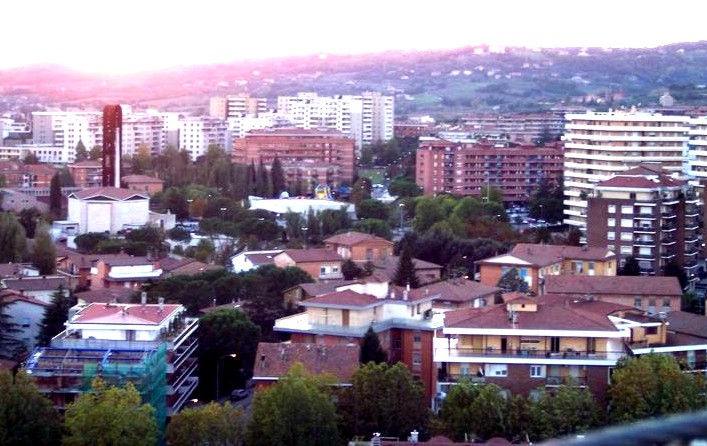
[Another shot of Ponte San Giovanni, where Guede in his early days apparently lived happily]
His change of fortune was like something out of the plot of the musical Annie. Rudy had met one of the Caporali sons at basketball. Now the family wanted to officially take him in as one of their own. He never lived with Roger again.
The change wasn’t smooth. Rudy found it difficult to adapt. When he moved out of Ponte San Giovanni, he lost touch with many of his old friends, which he found particularly hard.
They had been the bedrock in what had so far been a rather unstable family life. He soon missed the informality, the lack of pressure to succeed and the maternal bonds that Italian families are famous for.
It wasn’t long before his new father figure, Paolo Caporali, was calling Rudy ‘an inveterate liar’. He skipped school and spent his time in front of the television or on PlayStation. Caporali’s wife and kids were much kinder in their view:
Rudy was introverted and shy. He lied to protect himself, but not maliciously to hurt others or gain personal advantage.
The move from a poor area to the home of the super-rich Caporali family had confused Rudy and, to some degree, had embarrassed him.
His basketball trainer Roberto Segolini said Rudy was friends with everyone and never missed a training session. Where he could prove his worth and show success to his new high-status family, Rudy thrived.
With such a chequered school career, Rudy would find it hard to find a job that suited him once he left school. But at the age of nineteen he went to stay with an aunt in Lecco and landed a job as a waiter in Pavia.

[Shot of Lecco north of Milan where at age 19 Rudy Guede moved to live with an aunt]
Finally, he had found his way. He was ecstatic. He was now going to prove that he could knuckle down and stand on his own two feet. He thought about learning the trade and one day opening a restaurant.
But as soon as he settled in, the rug was pulled from under him - his employer was arrested and the business folded.
To someone with a fragile view of himself, this chance setback took on a great and doom-laden significance. Rudy blamed himself and worried about how he would explain his bad luck to the Caporalis.
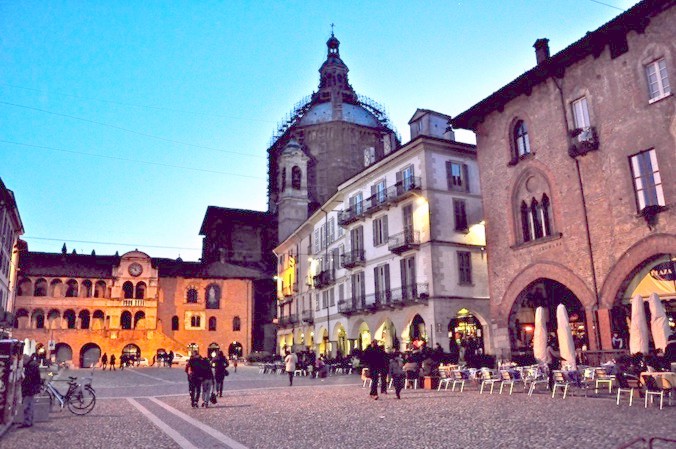
[Shot of Pavia south of Milan where Rudy Guede worked as a waiter till the restaurant collapsed]
Confidence shattered, he fled back to Perugia in shame. It was July 2007 and the beginning of the long summer that would end in tragedy.
The Caporalis were desperate to bolster his self-esteem. In August they found him a gardener’s job at a restaurant they owned out of town.
He stayed with the Mancinis, where the father and mother made sure he got up early to catch the bus. But the rot had set in; he wanted to live where the excitement was.
He was distracted by the scallywag antics of the lads in Perugia, who never seemed to work but always had money, and by the beautiful students from allover the world who were descending on the University to find digs and party.
Amanda and Meredith would be among them. Once he failed to go to work for a whole week, claiming he had flu and snivelling unconvincingly over the phone. He was sacked.
He lived off his savings until 2 November, when the murder and his doomed getaway would end any hopes he had of turning his life around.

[Shot of Mainz on the Rhine between Frankfurt and Bonn where Rudy Guede was captured]
Monday, May 03, 2010
From The Book Darkness Descending: The Insights On Knox And Sollecito
Posted by Peter Quennell
This is Hamburg above. And that is Berlin and its parliament (the Bundestag) below.
Amanda Knox speaks German and she spent several months in these two cities, staying for some weeks in in Hamburg with her relatives, and several days in Berlin, before moving to Perugia to start her study period there.
Darkness Descending is the book on Meredith’s case by two British writers from which we excerpted on Meredith a few days ago.
As far as we know the writers did not visit Seattle, and their focus is more generally on Italy and to some extent the UK. But they did offer this brief take on Amanda Knox, and also one on Raffaele Sollecito.
**********
From Darkness Descending by Paul Russell and Graham Johnson (Pocket Books) pages 291 and 292
Meredith had enjoyed making the pop video with her University of Leeds friends, but Amanda’s summer job, before travelling around Europe and going to Perugia, had not been so successful.
A politically well-connected uncle in Hamburg had got her an internship to die for - a job working for a German MP at the Bundestag. Kindly Uncle Uwe also set Amanda up with a flat on the .outskirts of Berlin.
Astonishingly, two days later, his seemingly ungrateful niece walked out on the job without telling anyone, moaning that she had nothing to do and she wasn’t sure if she was getting paid. Again, money was a big feature in her thoughts.
She’d spent most of the time reading Harry Potter and showed no curiosity about how the parliament or the high-powered people in there worked. She ignored conversations about its history and architecture.
After walking out, she spent her time drinking wine in the local bars and reading more Harry Potter.
Two days later she left Berlin for Hamburg, where her uncle was waiting for her. He was furious - she had let him down.
It seems Amanda craved excitement on her terms, usually based on getting drunk and goofing around.
Her friends said she simply feared boredom like any young girl. She showed a healthy streak of youthful carelessness, they said, no worse or better than anyone else. A video posted on YouTube showed her drunkenly giggling in a friend’s kitchen after downing shots.
On campus, back in the US, Amanda had been fined for being drunk and disorderly at a party held in a fellow student’s house. During the incident she had also insulted the police.
However, her defenders gave another version, portraying a magnanimous Amanda. They said that in fact she was courageously fronting up for her underage friends, who were in no state to talk to the police; she was the only one sober enough to handle the situation.
A big plus in her character assessment, they said, possibly displaying a sense of chivalry that would later get her into deeper trouble in Perugia.
Despite her college party lifestyle, there was no denying that Amanda was clever and that she could compartmentalize her life.
She made the Dean’s List, an elite commendation of the University of Washington reserved for the institution’s brightest students, and an honour that would ultimately qualify her for a prestigious and sought-after place on the study-abroad exchange programme.
If Amanda wanted something, she would go all out to get it, no messing around.
Raffaele Sollecito’s later years were quite different: he seemed to laze around and evade responsibility.
He posted pictures of himself on the internet wrapped in blood-covered bandages, brandishing a meat cleaver, and wrote a weird story to go with the images. In a blog he expressed satisfaction at once being lodged in the same hostel as the infamous ‘Monster of Foligno’, a murderer who slaughtered two youths in the 1990s.
And yet his new-found fascination with gory horror and violent comics would have surprised the friends he left behind at Licea Scientifico Einstein secondary school at Molfetta.
They said Raffaele suffered from excessive softness - his kickboxing instructor recalled that he even hesitated when kicking out, for fear of hurting the hardened expert.
***********
A few interesting insights there, though we could use more on Sollecito. For most of it, this is a pretty good book, the weak part being the closing analysis of the evidence. Two small corrections.
- The house where the notorious rock-throwing party took place was where Knox herself was living at the time. See here.
- Knox was not on an official University of Washington study-abroad program, as the university has rather anxiously tried to make plain. See here.
If Knox had indeed been on a proper study-abroad program - something many caring parents actually insist upon - her behavior might have been more restrained. She may not have moved in with Sollecito for one thing.
She may not have hit the drugs so hard. And she would not have run so desperately short of money, just when Patrick was apparently about to hire Meredith to replace her. No monthly checks were arriving from Seattle.
Maybe the second correction is not such a small one.
In fact, it is a pity that no writers have really explored all of this - there is, if anything, a surfeit of motives in this case, and the writers might be able to narrow them down.
Although he went to highschool in Molfetta (bottom shot here) and the book is correct on that, Raffaele Sollecito actually comes from Giovinazzo which is ten minutes drive south along the coast.
Both are north of Bari, where his father practices medicine.
Thursday, April 29, 2010
Amazon Reviewers Of New Dempsey Book Don’t Seem Universally Impressed
Posted by Peter Quennell
Click above for the Amazon customer reviews - there are nine reviews right now.
Oddly, the several reviewers that rate the book five stars are all writing their very first Amazon review - and their.language reads suspiciously similar.
In contrast, the reviewers that rate the book only one star seem to be genuine enough - all of them have a previous track-record of Amazon reviews.
So perhaps we could quote from a couple.
*********
By Amazon reviewer Norbert
Public Relations Spin by a Knox Family Acquaintance
Friends and family may appreciate this book for its sympathetic portrayal of convicted killers Amanda Knox and Raffaele Sollecito. Unfortunately, Ms. Dempsey’s bias is so obvious that she lacks all credibility.
Readers interested in truth and justice would be wasting their time here; this book is 100% spin. It constructs a kind of alternate fairy tale universe in which Knox and Sollecito are innocents abroad ... in a “holiday mood” on the morning after the murder.
This imaginary place is full of Italian stereotypes: Raffaele’s proud and loving parents, the bumbling & malevolent police, the paparazzi, the courtroom crucifix, and a demented prosecutor.
Ms. Dempsey’s between-the-lines message: the black guy did it!
Candace Dempsey is a Seattle-based food & travel writer who happens to be acquainted with the Seattle-based Amanda Knox clan. She is essentially a member the Knox defense team. And she’s moved way beyond her pay grade.
With a superficial knowledge of Italian and one or two visits to Perugia, she pretends to be a competent crime reporter.
The intention of the book (aside the profit motive) is to portray Knox as charming innocent abroad - while ignoring or distorting the mountain of evidence and testimony that led to a unanimous first degree murder conviction by an Italian jury on December 4, 2009.
Essentially “Team Knox” is trying to do for Amanda Knox what F. Lee Bailey and Johnnie Cochran did for O. J. Simpson.
*********
By Amazon reviewer Retired Farmer
Blatantly Biased, Shallow, and Inaccurate Version of Events
This book is the third one I have read on the Knox Case, and by far the worst.
The Seattle based author is apparently convinced of Ms Knox’s innocence and makes every effort in this book (and in her Seattle newspaper blog) to bring all readers to the same conclusion.
She does so by deliberately overlooking… irrefutable, obvious facts to the contrary .
Many have reported that Seattle based Ms Dempsey’s Seattle newspaper blog, and now her book pretty much totally conforsm to the media briefings and talking points of the large Seattle based public relations firm that the Knox family employed to publicly paint a favorable impression of Ms Knox and to promote a belief in her innocence here in the US.
This firm tightly controls access to the Knox Family, and very selectively allows very few approved spokespersons to speak with authors and reporters in the US media that the PR Firm works in.
Ms Dempsey apparently believes few of her readers are aware of the PR Firm and their self described ‘sometimes unorthodox’ methods. I say this because she promotes herself and her book by bragging about this Family access.
In fact, many have observed that she has sadly and shamelessly traded her objectivity for this Knox family access.
My suggestion to interested readers is to now obtain a good translation of the Motivations Report written by the Judges.
You will see for yourself the true reasons that Amanda Knox has been unanimously convicted of this horrific murder, as well as the innumerable inaccuracies and blatant bias in Ms Dempsey’s shallow, self serving, erroneous, dry and dreary version of these events.
Finally, IMHO, the PR Firm, their minions and some Seattle zealots have grossly distorted book reviews, ratings, and comments on this site, as well as engaging in some sad school yard name calling.
*********
By Amazon reviewer M C Rogers
Author is a friend of the Knox/Mellas family
Potential readers of this “story” would be well-advised that Ms. Dempsey is a friend of the Knox/Mellas family and approved by the PR firm hired by the Knox/Mellas family. This is hardly an unbiased piece of work.
Throughout the book, self-proclaimed feminist Dempsey refers to Knox and Meredith Kercher as “girls”.
She does her best to portray the victim, Meredith Kercher, as a stuck-up prude, and Ms. Dempsey paints Ms. Kercher’s British friends with the same brush, instead asking us to believe that Amanda Knox and her family somehow knew Ms. Kercher better than even her friends did.
Ms. Dempsey, while all throughout her blog on the subject, decries the tabloids and their treatment of the case, uses quotes from the Daily Mail to make what she must consider overwhelming proof of the family’s PR missive.
Readers have the right to know Ms. Dempsey’s ties to the family of Amanda Knox. For her to not make this connection known is deceptive and portrays Ms. Dempsey’ attempt at serious journalism in a very negative light.
Don’t waste your money. Take that $7.99 and make a donation to an organization that works hard for women who are victims of rape and abuse. RAINN is a good one, as is your local women’s shelter.
Dempsey is a woman who followed the victim’s family around, taking sneaky photographs of them.
Shameless.
Wednesday, April 07, 2010
The Transcript Of Today’s Online Chat Session With Barbie Nadeau Of The Daily Beast
Posted by Peter Quennell
Lucas Wittmann:
Hi, I’m the Books Editor at The Daily Beast and I’m delighted to welcome Barbie Latza Nadeau and our readers to discuss her new book, Angel Face…
BARBIE LATZA NADEAU:
I’m Barbie Latza Nadeau. Welcome.
[Comment From kcolorado: ]
how was your sense of who she is affected by seeing her in court everyday? Have you spoken with her directly?
BARBIE LATZA NADEAU:
Seeing Amanda Knox walk into the courtroom every day was very important in understanding how she interacted with her lawyers and her family, and in understanding how the jury perceived her. Amanda has not yet given any one-on-one interviews so no, I have not spoken to her directly.
Lucas Wittmann:
Just so you know we see your comments and will publish them live as Barbie is ready so please keep them coming…
[Comment From Kevad: ]
You have also stated in tv coverage that “we still do not really know what happened in that room”, is that how you still feel?
[Comment From stint: ]
Great job with book, Barbie. I really enjoyed it.
BARBIE LATZA NADEAU:
Yes, after over two years following this case, none of us know exactly what happened in Meredith’s bedroom that fateful night. No one has confessed to the crime, so until someone does, we will not have a clear understanding of the exact dynamic of the murder.
[Comment From Guest: ]
How do you think your journalism during the trial affected its outcome?
BARBIE LATZA NADEAU:
Thank you. I’m glad you liked the book. My hope is that it provides perspective of this complex case.
BARBIE LATZA NADEAU:
I don’t think that any of us who covered this trial as journalists had a direct impact on the jury’s decision. We were not in the deliberation room.
[Comment From Wade: ]
Why in your opinion did the seattle media frame the events as they did
BARBIE LATZA NADEAU:
I think that many of my colleagues in the Seattle market did the best job they could with the information they had. Their primary source was the Knox family, so their coverage was affected by that. When members of the Seattle press came to Perugia, they did not speak Italian and had a difficult time following the court sessions because there was no translator. Those of us who live and work here in Italy often helped the American press as best we could.
[Comment From stint: ]
Regarding earlier comment. Since Knox Family PR firm *very* closely controls any and all media contact with themselves, and they have reportedly blackballed any reporters even seen *near* you, do you really think you might interview Amanda in the future
BARBIE LATZA NADEAU:
I have hope that Amanda might want someone objective who understands Italian to conduct an interview with her at some point down the road. But because I have been skeptical, I am fairly sure I am not high on the list of interview candidates.
[Comment From mnh12121887:
But why did the American media take the Knox family version so much on face value without even trying to look deeper?
BARBIE LATZA NADEAU:
I think that the economic crisis has played a role. Many bureaus have been closed across Europe and it would have been a major expense to send a correspondent to Italy for such a long trial. I think that had there been a larger Italian based press corp it would have made a difference in coverage.
Lucas Wittmann:
Let’s explore now the facts of the case.
[Comment From Guest: ]
Do you believe Knox’s assertion that she was abused during her final interrogation?
BARBIE LATZA NADEAU:
I think it depends how you define “abused.” If you mean to ask if she was flicked on the back of the head (which is a cultural norm here in schools and in criminal investigations), then yes, that very likely happened. If you mean to ask if she was abused in the way the American police have been caught on CCTV abusing detainees, then no, I do not think she was abused.
[Comment From Guest: ]
You seem to have made some strange claims in your book - about AK and RS actually NOT remembering what happened. How on earth did you reach that conclusion?
BARBIE LATZA NADEAU:
I gave my hypothesis about the crime based on sitting through 11 months of a trial. I believe that if Amanda and Raf would have remembered exactly what happened, whether they were involved or not, their explanation of the evening of November 1 would have been more clear. A lie is often very black and white. Their confused responses seemed to me to be more consistent with a hazy memory or no memory at all.
[Comment From hattie: ]
I still believe that Amanda Knox is innocent, and I read your book to get another point of book. Thank you for that. My concern is that there is so much more DNA evidence against Rudy. How was Amanda able to clean up and not leave more DNA evidence in Meredith’s room?
Lucas Wittmann:
Don’t have Angel Face yet? Order it now as an e-book or paperback: http://bit.ly/chDjIX
BARBIE LATZA NADEAU:
I think it is important to remember that the same scientific police and laboratories tested the DNA for all three suspects. That is to say, if the DNA matches Rudy and is accepted, then the DNA that matches the other two should also be accepted. How she may have left so little DNA if she was actually in the room is very hard to square. Whether some of the 14 unidentified fingerprints belong to her is a big question in this case. There were very few fingerprints on any flat surfaces belonging to Rudy either. Is it possible to pick and choose how to clean up DNA? Maybe not, but it is possible to wipe up fingerprints and footprints that you know are your own.
[Comment From Guest: ]
If they didn’t remember then why did they do the clean up? They clearly knew they had ‘something’ to hide!
BARBIE LATZA NADEAU:
That is a very good question. Perhaps waking up in a house with a dead body makes one act irrationally. Perhaps because they might not have remembered what they did the night before, they panicked. We do not know, but that is one question I will ask Amanda if I ever get a chance.
[Comment From Guest: ]
After 11 months viewing the trial, do you believe that Amanda joined in any sort of sex game with Meredith? It seems that Amanda did, bt then went to her room BEFORE and DURING the murder.
BARBIE LATZA NADEAU:
There is no forensic evidence that Amanda had sexual relations with Meredith. I have a hard time accepting that it started as a sex game. I believe that if they were involved it was because they could not stop themselves from an aggravated escalation of violence. In essence, they could not tell agony from ecstasy and did not realize that Meredith needed their help. Instead, they may have helped Rudy and that is when things got out of control.
[Comment From Lisa: ]
I see that some folks her responded to the question “Who Killed Meredith Kercher” with “Amanda and Raffaele” only. No Rudy. How could that be? Do you think journalism had anything to do with that?
Lucas Wittmann:
We’re going to wrap this up in 10 minutes so please contribute any final questions now.
BARBIE LATZA NADEAU:
I think that the fact that Rudy’s trial was sewn up before Amanda and Raffaele’s began is the reason many people separate them in this crime. But Rudy was convicted for his role in the murder, not as a lone assailant. His judge’s reasoning clearly states that he felt Rudy acted in tandem with Amanda and Raffaele.
[Comment From mhm12121887: ]
What is happening now—in Italy?
[Comment From Noel: ]
How do you see the appeal going?
BARBIE LATZA NADEAU:
Right now lawyers for both Amanda and Raf are preparing their appeal briefs. Those will be filed within a few weeks and then the date will be set for the appeal hearing, likely in the fall.
[Comment From Kermit: ]
Hi Barbie. Your journalism has opened up transparency and debate from an Iron-Curtain situation of control in the American press. Where do you see each of the three convicted (pending appeal) murderers 10 and 20 years from now?
[Comment From stint: ]
Thanks so much for this opportunity, and again thanks for all your objective coverage in “Angel Face”.... great read.
BARBIE LATZA NADEAU:
I think that the appeal will result in a few years taken from the sentences of both Amanda and Raffaele.
[Comment From Guest: ]
hasn’t her real beauty complicated this hugely from day one?
[Comment From hattie: ]
Thank for an excellent book. I read it in one day, and it gave me a different side of the story. I hope that both pro- and anti-Amanda sides will take an opportunity to read this book.
BARBIE LATZA NADEAU:
I think that it is very likely that all three of the convicted murderers of Meredith Kercher will return home one day.
Lucas Wittmann:
Here is the link if you’d like to order the Angel Face e-book and paperback: http://bit.ly/chDjIX
[Comment From mhm12121887: ]
Thanks also for the book and for the “on the spot” reporting and objectivity
BARBIE LATZA NADEAU:
I think that Amanda’s beauty has increased the interest in this case, but I do not think that it dictated the outcome.
[Comment From Patty: ]
Thanks for answering questions Barbie.
Lucas Wittmann:
Down to our final question…
[Comment From somealibi: ]
(For the end) Compliments on the presentation and technology with the poll-type questions
[Comment From Patty: ]
Do you think any of them will ever confess?
[Comment From Guest: ]
You’ve been a real heroine in this case Barbie. Well done for your objective reporting.
Lucas Wittmann:
Thanks for answering the polls!
BARBIE LATZA NADEAU:
I think that one day we will have a confession, yes. But not while they are in prison.
Lucas Wittmann:
Wait…one more!
[Comment From Guest: ]
Can you give your reactions to the 2 op-ed pieces in the NYTimes (Seattle writere)?
[Comment From Guest Guest: ]
Can we have another session please????
Lucas Wittmann:
Re: another session. So many great comments and questions, we’ll keep it in mind.
BARBIE LATZA NADEAU:
I was in Perugia when those op-ed pieces came out and they were not helpful to Amanda. The prosecutor was angry, the jury members were insulted and Amanda’s own lawyers were not happy. Op-ed pieces are by nature controversial, but they should be weighed to see whether they will impact the topic. That sort of journalism likely had more impact on this case than what anyone wrote with a Perugia dateline.
Lucas Wittmann:
Thanks everyone for participating!
And thanks Barbie for answering all these great questions.
[Comment From ricardoricardo: ]
which ‘op-ed’ pieces > do you have a link ?
Lucas Wittmann:
Here is the link: http://opinionator.blogs.nytimes.com/2009/06/10/an-innocent-abroad/
[Comment From Guest: ]
Cheers Barbie! Will raise a glass to you tonight…
BARBIE LATZA NADEAU:
Thank you. I want to also thank Andrea Vogt, of the Seattle P-I who was a voice of reason in Seattle during the trial based in Italy. The op-ed pieces are by Timothy Egan.
[Comment From Guest:]
Thank you. This is nice technology and nice pace. Could have been twice as long 😊
[Comment From somealibi: ]
Keep it going Barbie - thanks - we value an objective take
Lucas Wittmann:
Thanks again to everyone and we’ll definitely keep this in mind the next time.
[Comment From ricardo: ]
many thanks…
[Comment From Patty: ]
Thank you, and Andrea, for your coverage of the trial. Invaluable.
BARBIE LATZA NADEAU:
Thanks to everyone who sent question.
[Comment From Clander: ]
Ciao from Roma !! You ROCK Barbie !
The Daily Beast’s Online Poll: Clear Majority For All Three Having Been Involved
Posted by Peter Quennell
Thursday, March 04, 2010
Sentencing Report: Barbie Nadeau Quotes The Motive, Physical Evidence, And Alibis
Posted by Peter Quennell
Please click above for Barbie Nadeau’s full report on the Daily Beast website. Key excerpts.
1) The motive
“One can hypothesize that the bad decision came after the consumption of stupefying substances.”
But they disagreed on the motive. The prosecution lawyers began their case in January, 2009 by arguing that Kercher was killed during a sex game gone awry. By closing arguments, they had changed the theory slightly, trying to make the case that Knox resented her prissy British roommate and killed her in hatred. The jury rejected both theories, and the reasoning document declares that “the killing was carried out with no planning, no animosity and no revenge against the victim.
“The two young lovers, interested in each other and in the intellectual and cultural world around them, would not have made a conscious decision to kill Kercher. Instead, the judge wrote, they killed spontaneously under the influence of drugs. “One can hypothesize that the bad decision came after the consumption of stupefacente””stupefying substances””that Amanda verified in her testimony.”
As the jury saw it, Knox, Sollecito and Rudy Guede, the Ivory Coast native who was convicted for his role in Kercher’s murder after a fast-track trial in 2008, came to the house the two girls shared in order to get high. Guede used the toilet, then became aroused when he saw Knox and Sollecito making out. He went to Kercher’s room and made sexual advances toward her. The reasoning refers to evidence presented at Knox’s trial that Guede was the type of guy that “bothered women” when he was under the influence.
Then, according to the reasoning, Kercher cried out for help, but instead of helping her, Knox and Sollecito, their judgment impaired, decided instead to help Guede. The killing was based on “sexual-erotic violence” but not with Knox as the mastermind. The jury felt that it was Guede who led that attack, and the other two, too high to know better, joined in.
2) The physical and forensic evidence
The judge’s reasoning also underscores what the jury believed to be the most important elements of the prosecution’s forensic case. They believed that a kitchen knife with Knox’s DNA on the handle and a trace of Kercher’s on the blade was the weapon that made the large fatal wound in Kercher’s neck. They also referred to Sollecito’s “knife habits,” surmising that, as an admitted collector of blades, he likely used his own knife to make the second wound. The jury agreed that Sollecito and Knox conspired to stage a break-in in another bedroom to cover their tracks.
And they attributed an unidentifiable bloody shoeprint found on the pillow under Kercher’s body to Knox, even though the prosecution only implied that it was compatible with a woman’s shoe size. A spot of Knox and Kercher’s mixed blood in one of the bedrooms, found using Luminol, and four additional spots in the small bathroom the girls shared also swayed the jurors.
“These were left when Amanda was cleaning her hands and feet of Kercher’s blood,” the judge wrote.
3) The Knox and Sollecito alibis
The judge also wrote emphatically about the lack of credible alibi. Although Knox and Sollecito claimed to be at his apartment all night, “Not one phone call, not one meeting, no computer activity or any other element proved that they stayed at that apartment.” And the judge was particularly hard on Knox for accusing Patrick Lumumba, an innocent man, of the murder “knowingly and deceivingly.”
Overall, however, it appears that the jury was sympathetic to the two suspects, but ultimately felt that they committed a crime for which they must pay a hefty price.
Sentencing Report: La Repubblica Has The Most Substantive Report So Far Today
Posted by ziaK
Click above for the Repubblica’s story in the original Italian.
This translation below is of this the longest report so far today in the Italian media, presumably by staff reporters in Perugia, although it is unsigned.
Verdict filed in Meredith crime: Murder arising from Guede’s sexual violence
PERUGIA - Four hundred and twenty-seven: This is how many pages it took for the judges of Perugia’s Court of Assizes to explain the sentence on the murder of Meredith Kercher in Perugia on 1 November 2007. For this crime carried out, the judges wrote, “without any planning, without any animosity or feeling of rancour”, Amanda Knox and Raffaele Sollecito were sentenced to 26 and 25 years imprisonment, respectively. For the same crime, Ivory Coast national Rudy Guede was sentenced (to 30 years following a “fast-track” trial, subsequently reduced to 16 years in appeal) and is currently waiting to file an appeal with the Supreme Court. The Perugian judges wrote: “The motive, was of an erotic, sexually violent nature, which riginated in the evil choice made by Rudy, and elicited the active collaboration of Amanda and Raffaele.”
From Viterbo prison, where he is held, Rudy wrote a letter with an appeal: “to those who know, talk”. A request which appears to be addressed to the same Amanda and Raffaele (both - particularly the American student whom he has always claimedto know - pointed to by Rudy as having been present at the crime scent, ndr) who have always declared themselves to have no involvement in the affair.
Together, all the elements which emerged during the process “demonstrated a comprehensive and unified picture, without gaps and inconsistencies”, wrote the judges in the file signed by the Court President, Giancarlo Massei and by assessor judge Beatrice Cristiani. According to the College [as in the board of judges], the picture that emerges “has, as its necessary and strictly consequential outcome, the attribution of the hypothesized facts of the crime to both the accused.”
The measure furthermore asserts that Knox “freely accused Patrick Diya Lumumba of having killed Meredith, and so accused him with the full knowledge of the innocence of the same Lumumba”. The judges underlined that there had not been “any confirmation” that Amanda had been urged by the investigators to accuse Lumumba. For Perugia’s Court of Assizes, the objective aimed at by the American (who was also convicted for the crime of calumny with regard to the Congolese [sic] musician, ndr) was to “lead the investigators down the wrong path, far from that which could have led them to establish her own responsibility, and that of her boyfriend”. “Such behaviour is a choice”, wrote the Court, “and thus merely defensive: Amanda had a good relationship with Lumumba, by whom she had always been well treated, and therefore there could have been no motive for rancour, animosity, revenge which could have justified such a serious accusation.”
The murder of Meredith Kercher, it further reads, was carried out “without any planning, without the animosity or feeling of resentment towards the victim which in some ways can be seen as the preparation/predisposition to commiting a crime”. According to the board of judges, “the actions turn out to have been carried out as a result of purely coincidental events”.
In the judges’ report, they talk of “purely coincidental events which, when joined together with each other, created a situation which, in the combination of various factors, made possible these crimes to the detriment of Meredith: Amanda and Raffaele who suddenly found themselves without any commitments, meet Rudy Guede by chance (there is no trace of any appointment having been made), and find themselves together at the house on the via della Pergola on the very evening (between 1 and 2 November, ndr) that Meredith is there alone”. According to the judges, “even the behaviour towards Meredith - once the assault and the murder have been commited - which consisted in covering her lifeless body, shows a feeling of pity for the victim, refusal, and thus a sort of repentance for what has been done: refusal and repentance shown through such an act of pity.”
The judges attributed the material criminal act, that is, the sexual violence, to Rudy Guede, who was aided by Amanda and Raffaele, weakened by the drugs they had consumed. The judges wrote: “Amanda and Raffaele participated actively in the criminal actions carried out by Rudy with the aim of overcoming Meredith’s resistance, subjugating her will, and allowing Rudy to relieve his lustful urges.” The judges also wrote in their report: “The prospective of helping Rudy achieve his aim of subjugating Meredith in order to sexually abuse her may have appeared to be an exciting detail which, although unforeseen, should be tried”.
“The motive”, added the Perugian judges, “was therefore of an erotic, sexually violent nature, which originated in the evil choice made by Rudy, and elicited the active collaboration of Amanda and Raffaele. That such participation, active and violent, had also involved the current defendants as well as Rudy can be deduced from what has been observed in talking about the lesions suffered by Meredith, by the outcome of the genetic investigations, by the prints of bare feet found in various parts of the house.”
According to the judges, in this murder case, one of the tests, carried out by several people, is confirmed by Meredith’s physical strength, by the fact that she was conscious on the evening of the assault, and by her previous experience in the gym. “Meredith, when the violence began, was awake and dressed, and was not laying down on her bed.” Furthermore: “According to the analyses, the young woman had a slender and well-endowed physique, and was physically very strong, as was claimed by Meredith’s mother and sister. She had even done boxing”.
Thursday, February 25, 2010
A Common View In Legal Circles: Knox Campaign Often Talks Legal Nonsense - As On Oprah
Posted by Peter Quennell
(1) This is the position lawyer Theodore Simon took in December 2008 on NBC Dateline as an impartial commentator then being straight with the American public.
“Theodore Simon thinks the prosecutors evidence made public so far is daunting. The defense could argue a faked robbery, and a moved body, and contamination, but eventually it could become like whack-a-mole, and all of their arguments could lose force.”
(2) This is the position Theodore Simon takes on the Oprah Winfrey show in February 2010 now that he is on the payroll and seemingly trying hard to mislead the American public. “The case makes no legal sense.”
The recent appointment of Theodore Simon as the US legal adviser to the free-Knox campaign met with some ridicule in Italy.
We certainly begin to see why.
Ted Simon’s performance on the Oprah Winfrey show sounded to us a lot like the hapless John Q Kelly. How grounded in either the very hard evidence or the very-different Italian law really is he?
The highly-respected Spokane lawyer Bill Edelblute (who we have quoted before) now weighs in forcefully on the New York Examiner website on the many claims made on the Oprah Winfrey show.
He pretty well reflects here what many other good lawyers are telling us: Don’t take any legal advice from that campaign - not if you actually want to win some…
Concerning the callous uncaring attitude to the Kerchers
Mr Edelblute starts by examining an arrogant and almost pathologically callous remark made by Curt Knox about the family of Meredith.
The parents of Amanda Knox lament the limited contact they now have with their daughter due to her imprisonment, while awaiting the upcoming appeal. Only near the end of at least the ABC news account of the interview do they give any mention of the victim and the Kercher family.
Here’s what they have to say in comparing their loss with that of the relatives of the murdered beautiful British student. In commenting on the fact that they would not welcome a call from the Kerchers, Curt Knox explains it this way:
“We still have a chance with Amanda, and they don’t with their daughter,” he said, and that any such discussion might be best to take place only if the Kerchers are positive Amanda is innocent. “We still have a chance with Amanda, and they don’t with their daughter.” No, they don’t have a chance with Meredith Kercher, because someone murdered her. Amanda Knox has been convicted of that murder, subject to appeal.
Let’s see - - the victim’s parents are supposed to believe Amanda is innocent before they ever dare speak to the parents of Amanda Knox. Guilty or innocent, the parents of Amanda Knox did not murder anyone, so why would they place conditions on what the Kerchers have to believe before ever speaking to them?
Hint - the reaction of the Kerchers to the verdict was one of believing justice has been done, not of believing the trial went horribly wrong. Don’t expect them to change their belief anytime soon.
The Kerchers did not make Amanda Knox turn cartwheels, make out with her boyfriend a few feet from where the body was just discovered, or to change her story several times, or to say that she heard Meredith scream, and that a black individual was in the bedroom with Meredith. It was scientifically proven with DNA that a black man, Rudy Guede, was in that room, and he said Meredith was screaming, just like Amanda said. Who is at fault for all that? The victim’s parents, or Amanda’s sisters?
The chances that the Kerchers feel they need to speak to anyone about the murder of their completely blameless daughter who has not been shown to have done anything other than act like a normal college student, with normal boundaries on her behavior, are nil.
The Kerchers have nothing to explain, but deserve more than an apology from anyone who has made the rights of their daughter a non-issue. And the parents of an accused also have nothing to explain, but when they decide to conduct a media campaign, do they set conditions for the parents of the victim?
Concerning Amanda Knox’s sisters
Bill Edelblute contends with a couple of the often-loose claims of Deanna Knox, well worth reading in the original, and then has a long commentary on the use of young children as PR puppets. He concludes “When comedy fundraisers for Knox don’t do the trick, try making a kid cry.”
Concerning Oprah’s performance
Next he assesses Oprah Winfrey as host - like us, he clearly believes Oprah was under-researched and under-briefed and fell into several traps. He commends her for not simply taking an “she’s innocent” stance and for asking a few blunt questions, concluding:
- She aired a written statement by Lyle Kercher, brother of victim Meredith Kercher, who apparently was invited to appear or speak live, but declined. However, this was at the end of the segment when it probably belongs right smack in the middle. A photo of Meredith was flashed only very briefly.
But much of how Oprah handled the show he clearly did not like - becoming mushy over Amanda, misleading her audience on the sequestering of juries, and making an anti-Italy crack.
- Oprah made a unequivocal statement that the jury was not sequestered, as it would have been in America. That is not true. Even in murder cases, juries are not routinely sequestered throughout the trial. It is possible a judge would grant such a request upon motion by attorneys. It is possible a jury might have been sequestered during deliberations, but not during the trial, or both, or neither….
- When Edda Mellas told Oprah that Amanda said in a phone call to “tell Oprah I love her” Ms. Winfrey displayed what was clearly a flattered smile. You are just told that someone who has been convicted of murder, albeit subject to appeal, likes you, and you react as though someone’s puppy has taken an immediate liking to you, or have received a much sought after complement. We don’t know what Meredith Kercher thinks of Oprah or her show, as her life was taken and she is not here to groom and manipulate others, as is Amanda Knox even from a prison cell. (Nor would Meredith need to do so.)
- For the banal statement, while turning to the audience: “If you want to be tried - you want it to be in the U.S.A.!” Sure about that? Amanda will get two levels of appeal as a matter of right in Italy. In her home state of Washington, she would have only one. Oprah’s statement clearly implies the Italian system is not fair compared to that of the U.S., when there is no evidence of that, and implies there are more procedural protections, when there is no evidence of that.
We could have added this one: Oprah ignored the huge money-making operation and where all the money is going - for example, the very large sums that seem to be spent to mislead the American audiences.
Concerning Elizabeth Vargas
He then takes a look at the quality of the reporting of ABC’s Elizabeth Vargas, who is notorious for repeatedly omitting key facts, muddling what the jury hears in court with what the media says outside, denigrating Italy and the Italian players, taking a very one-sided position (she is believed to have an exclusive deal with the PR campaign, one never made public on-air), and in general misinforming ABC’s viewers.
He judges her commentary as follows: “Ms. Vargas is loose with the facts. There is almost no value of any kind in what Ms. Vargas had to offer, and negative value, when it comes to attacking a legal result with nothing to back it up, murdering the truth.”
Concerning Theodore Simon
Bill Edelblute then has serious contention with many of the remarks of Ted Simon, again well worth reading in full.
On Knox pointing to a black man, Patrick Lumumba, now, as our post below underscores, replaced as the sole perp of choice by another black man, Rudy Guede.
Oprah asked him if the fact that Amanda “pointed at an innocent man” reflected on her integrity. His answer: “Quite to the contrary.” So it meant she had good integrity, being to the contrary of reflecting poorly upon it? The tired old refrain that the police forced her to know that it was a black man in Meredith’s room does not mean Amanda was of good integrity, even if believed. Simon’s answer just means his gun was cocked to say “to the contrary” to any evidence against Amanda. Amanda would let an innocent man rot in prison, potentially for the 26 years she is doing, if he hadn’t been able to convince the court of his alibi.
Yet it is “to the contrary” to suggest she has no integrity to allow Patrick to unjustly be deprived of his freedom, business, and reputation? Simon pointed out there had been no interpreter. Knox didn’t say she had been misunderstood when accusing Lumumba. She testified she made the false accusation only after being hit on the back of the head by a policewoman who she could not identify. What does lack of an interpreter have to do with the point of accusing an innocent man? He was in prison two weeks. Did Knox ever say during that time - no, he’s not involved, you’ve got an innocent man in prison? His bar that employed Knox is now closed. A product of Knox’s false accusations.
On Ted Simon on the physical evidence in the house.
Simon rattled off a list of things not found in the room where Meredith was found, such as Amanda’s hair, DNA, sweat, etc. He did not mention that no murder weapon, which had to have once been in the room, was found in the room either.
So is Meredith still alive? Simon did not mention the DNA of Amanda and the victim being on a knife where Amanda claimed at times she had spent the night of the murder.
He could have added - as our DNA experts here have often pointed out - that there was zero reason for Knox’s DNA to be in Meredith’s room if she was simply standing there with a knife, goading the men on and taunting Meredith. And that a bloody footprint of Knox’s size was found in the room, on a pillow. And that the mixed DNA of Knox and Meredith was found at five locations - and that mixed DNA had to have been deposited very recently.
And that it had to have been Knox who moved Meredith’s body - nobody else had a need to. And that Amanda Knox’s bedside lamp was found in Meredith’s locked room, presumably used in the cleaning up and rearranging of the crime scene - of which there is no doubt.
He continues on the physical evidence.
Simon does not identify any rule of law that says the sweat of the accused has to be found in the room where the the victim’s body is found. Yet, he says the case “makes no legal sense.”
This is a case in which there is an admission of being at the scene, of the DNA of the accused and a victim being on a knife, of knowledge that Meredith screamed while a black man was in a bedroom with Meredith.
A black man was in a bedroom with Meredith, Rudy Guede, as shown by his DNA. Guede, though denying murder, says he heard Meredith scream. Knox said she screamed, before Guede was known by police to be involved. How did she know what Guede knew?...
There is no legal element missing, it is more a question of the independent strength of certain pieces of evidence, all put together the jury was convinced, and that is their role in the system.
Hmmm. That seems to make a lot of legal sense.
And concerning Curt Knox and Edda Mellas
Finally Bill Edelblute questions many of the claims of Curt Knox and Edda Mellas of bias in the legal process and the Italian media. Please see his original post. He comments further on Curt Knox’s almost pathologically callous remark with regard to Meredith’s family.
While the comments above about the Kerchers could be construed as acknowledging their loss of their daughter, of having “no chance”, as worse than the situation of the Knoxes, I’m not so sure. Because clearly Curt Knox then says that to speak to them, the Kerchers would have to acknowledge Amanda was innocent.
That thinking is the product of a different kind of mind. the Kerchers don’t have to do anything, it is not a question of why Curt Knox would not lower himself to talk to them, it is a question of why the Kerchers would bother.
In other words, why would Meredith’s family WANT to reach out to the family of a possible charming psychopath found guilty of killing their daughter, who still shows zero remorse? Especially when her family seem to display some chilling psychologies of their own.
Fine brave careful humane work by Bill Edelblute and the Examiner. which is helping to re-educate a huge component of the American public on the stark realities of the case. Reader comments on the Examiner website and every other website we have looked at are running at least four or five to one against Oprah, Curt Knox, and Edda Mellas.
Something in their campaign must be broken. Perhaps they should just pack up and stay home.



